
Organization of scientific events [97]

Updated: Dec. 31, 2024 (Initial publication: Jan. 1, 2024)
Organization of scientific events
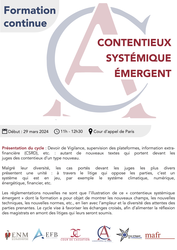
► Full Reference: M.-A. Frison-Roche, Coordination of the cycle of conference-debates Contentieux Systémique Émergent (Emerging Systemic Litigation), organised on the initiative of the Cour d'appel de Paris (Paris Cour of Appeal), with the Cour de cassation (French Court of cassation), the Cour d'appel de Versailles (Versailles Court of Appeal), the École nationale de la magistrature - ENM (French National School for the Judiciary) and the École de formation des barreaux du ressort de la Cour d'appel de Paris - EFB (Paris Bar School), under the scientific direction of Marie-Anne Frison-Roche
____
► This Cycle in few words: Duty of vigilance, supervision of platforms, non-financial information (CSRD), etc.: as many new texts that bring new types of disputes before the courts.
Despite their diversity, the cases brought before the most diverse judges present a unity: through the dispute that pits the parties against each other, it is a system that is at stake, for example the climate system, digital system, energy system, financial system, etc.
New regulations are just the illustration of this "Emerging Systemic Litigation"; the conference-debates aiming at showing the new fields, new techniques, new standards, etc., in relation to the scale and diversity of stakeholders' expectations. This cycle is designed to encourage cross-fertilisation, so as to provide judges with food for thought ahead of the litigation they will be called upon to deal with.
Les réglementations nouvelles ne sont que l’illustration de ce « contentieux systémique émergent » dont la formation a pour objet de montrer les nouveaux champs, les nouvelles techniques, les nouvelles normes, etc., en lien avec l’ampleur et la diversité des attentes des parties prenantes. Le cycle vise à favoriser les échanges croisés, afin d’alimenter la réflexion des magistrats en amont des litiges qui leurs seront soumis.
____
🔴Registrations and information requests can be sent to: inscriptionscse@gmail.com
🔴For the attorneys, registrations have to be sent to the following address: https://evenium.events/cycle-de-conferences-contentieux-systemique-emergent/
⚠️The conference-debates are held in person only, in the Cour d’appel de Paris (Paris Court of Appeal).
____
► General Presentation of the Cycle: In 2024, the Cour d’appel de Paris (Paris Court of Appeal) created a new specialised chamber: chamber 5-12 Contentieux émergent – Devoir de vigilance et responsabilité écologique (Emerging litigation - Duty of vigilance and environmental liability). Vigilance litigation is an example of what is emerging more generally: Systemic Litigation, often linked to technologies. This calls for a new way of judging, organising procedures and relations between professionals. A series of conference-debates on Emerging Systemic Litigation (ESL) is being organised jointly by the Paris Court of Appeal, the Versailles Court of Appeal, the Cour de cassation (French Court of cassation), the École nationale de la magistrature - ENM (French National School for the Judiciary) and the École de formation des barreaux du ressort de la Cour d'appel de Paris - EFB (Paris Bar School), under the scientific responsibility of Professor Marie-Anne Frison-Roche.
In this context, a series of conference-debates involving professionals from a wide range of backgrounds is being proposed on the following themes:
- 🧮the very notion of "Emerging Systemic Litigation" and the role of the judiciary in it (29 March 2024): read the report of this event
- 🧮vigilance, insofar as it gives rise to Systemic Litigation, notably because it takes legal form in numerous contracts, for example in employment relationships (26 April 2024): read the report of this event
- 🧮the inclusion in Emerging Systemic Litigation of information reliability techniques, particularly with regard to content available on platforms (27 May 2024): read the report of this event
- 🧮the way in which artificial intelligence is generating Systemic Litigation and the influence of new specific texts (24 June 2024): read the report of this event
- 🧮sustainability, a principle of systems found in reports and transitively in disputes concerning their development, their standards and even their control (9 September 2024): read the programme of this event
- 🧮new evidentiary techniques required by Emerging Systemic Litigation, to account for systemic needs, e.g. climate and digital systems, and how firms respond to them (14 October 2024): read the programme of this event
- 🧮Vigilance General Procedural Law, in that it incorporates the Systemic dimension of Vigilance Litigation (18 November 2024): read the programme of this event
- 🧮institutional and case law feedback from courts on Emerging Systemic Litigation (16 December 2024): read the programme of this event
____
🧮read below the full programme of this cycle of conference-debates⤵️
Dec. 16, 2024
Organization of scientific events
► Référence complète : L’expérience des juridictions dans le Contentieux Systémique Émergent, in cycle de conférences-débats "Contentieux Systémique Émergent", organisé à l'initiative de la Cour d'appel de Paris, avec la Cour de cassation, la Cour d'appel de Versailles, l'École nationale de la magistrature (ENM) et l'École de formation des barreaux du ressort de la Cour d'appel de Paris (EFB), sous la responsabilité scientifique de Marie-Anne Frison-Roche, 16 décembre 2024, 11h-12h30, Cour d'appel de Paris, Première Chambre
____
► Présentation de la conférence :
____
🧮Programme de cette manifestation :

Nov. 21, 2024
Organization of scientific events
► Full Reference: M.-A. Frison-Roche, coordination of the conference Les pratiques juridictionnelles au service d'un espace juridique pour le futur (Jurisdictional practices at the service of a legal area for the future), in Cour de cassation (French Court of cassation), Cycle of conferences "Penser les pratiques juridictionnelles au service d’un espace de justice", November 21, 2023, 16h-18h
____
► General presentation of the conference:
____
🧮read the programme of the cycle of conférences in 2023 (in French)
________

Nov. 18, 2024
Organization of scientific events
► Full Reference: Le Droit processuel de la Vigilance (Vigilance General Procedural Law), in cycle of conference-debates "Contentieux Systémique Émergent" ("Emerging Systemic Litigation"), organised on the initiative of the Cour d'appel de Paris (Paris Cour of Appeal), with the Cour de cassation (French Court of cassation), the Cour d'appel de Versailles (Versailles Court of Appeal), the École nationale de la magistrature - ENM (French National School for the Judiciary) and the École de formation des barreaux du ressort de la Cour d'appel de Paris - EFB (Paris Bar School), under the scientific direction of Marie-Anne Frison-Roche, November 18, 2024, 11h-12h30, Cour d'appel de Paris, Cassin courtroom
____
► Presentation of the conférence:
____
🧮Programme of this event:
Seventh conference-debate
LE DROIT PROCESSUEL DE LA VIGILANCE
(VIGILANCE GENERAL PROCEDURAL LAW)
Paris Court of Appeal, Cassin courtroom
Presentation and moderation par Marie-Anne Frison-Roche, Professor of Regulatory and Compliance Law, Director ot the Journal of Regulation & Compliance (JoRC)
🕰️11h-11h20. 🎤, by 🕴️Marie-Anne Frison-Roche, Professor of Regulatory and Compliance Law, Director ot the Journal of Regulation & Compliance (JoRC)
🕰️11h20-11h40. 🎤, by 🕴️Natalie Fricero, Emeritus Professor of Law at Côte d'Azur University
🕰️11h40-12h30. Debate
____
🔴Registrations and information requests can be sent to: inscriptionscse@gmail.com
🔴For the attorneys, registrations have to be sent to the following address: https://evenium.events/cycle-de-conferences-contentieux-systemique-emergent/
⚠️The conference-debates are held in person only, in the Cour d’appel de Paris (Paris Court of Appeal).
________
Oct. 14, 2024
Organization of scientific events
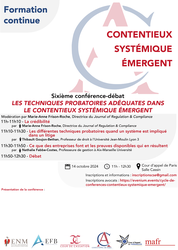
► Full Reference: Les techniques probatoires adéquates dans le Contentieux Systémique Émergent (Appropriate Evidentiary Techniques in Emerging Systemic Litigation), in cycle of conference-debates "Contentieux Systémique Émergent" ("Emerging Systemic Litigation"), organised on the initiative of the Cour d'appel de Paris (Paris Cour of Appeal), with the Cour de cassation (French Court of cassation), the Cour d'appel de Versailles (Versailles Court of Appeal), the École nationale de la magistrature - ENM (French National School for the Judiciary) and the École de formation des barreaux du ressort de la Cour d'appel de Paris - EFB (Paris Bar School), under the scientific direction of Marie-Anne Frison-Roche, October 14, 2024, 11am.-12.30pm., Paris Court of Appeal, Cassin courtroom
____
► Presentation of the conference:
____
🧮Programme of this event:
Sixth conference-debate
LES TECHNIQUES PROBATOIRES ADÉQUATES
DANS LE CONTENTIEUX SYSTÉMIQUE ÉMERGENT
(APPROPRIATE EVIDENTIARY TECHNIQUES
IN EMERGING SYSTEMIC LITIGATION)
Cour d’appel de Paris, salle Cassin
Presentation and moderation by 🕴️Marie-Anne Frison-Roche, Professor of Regulatory and Compliance Law, Director of the Journal of Regulation & Compliance (JoRC)
🕰️11am.-11.10am. 🎤La crédibilité (Credibility), by 🕴️Marie-Anne Frison-Roche, Professor of Regulatory and Compliance Law, Director of the Journal of Regulation & Compliance (JoRC)
🕰️11.10am-11.30am. 🎤Les différentes techniques probatoires quand un système est impliqué dans un litige (The various evidential techniques when a system is involved in a dispute), by 🕴️Thibault Goujon-Bethan, Professor of Law at Jean-Moulin Lyon 3 University, director of the Centre patrimoine et contrats, director of the IEJ de Lyon
🕰️11.30am.-11.50am. 🎤Ce que des entreprises font et les preuves disponibles qui en résultent (What firms are doing and evidence available as a result), by 🕴️Nathalie Fabbe-Costes, Professor of management at Aix-Marseille University
🕰️11.50am.-12h30pm. Debate
____
🔴Registrations and information requests can be sent to: inscriptionscse@gmail.com
🔴For the attorneys, registrations have to be sent to the following address: https://evenium.events/cycle-de-conferences-contentieux-systemique-emergent/
⚠️The conference-debates are held in person only, in the Cour d’appel de Paris (Paris Court of Appeal).
________

Sept. 25, 2024
Organization of scientific events
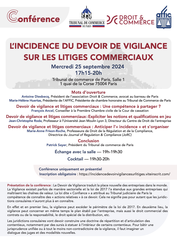
🌐follow Marie-Anne Frison-Roche on LinkedIn
🌐subscribe to the Newsletter MAFR Regulation, Compliance, Law
____
► Full Reference: M.-A. Frison-Roche, coordination of the conference L'incidence du devoir de vigilance sur les litiges commerciaux (The impact of the duty of vigilance on commercial litigation), Tribunal de commerce de Paris (Paris Commercial Court), Droit & Commerce and Association Française en Faveur de l'Institution Consulaire (AFFIC), Tribunal de commerce de Paris, 25 September 2024, 5.15p.m. to 8p.m.
____
► General presentation of the conference: The Duty of Vigilance reflects the new role of firms in the world. Vigilance sometimes existed on a sectoral basis, but the 2017 French law extended it to large companies that control value chains. The French so-called "confiance" law gave the Tribunal judiciaire de Paris (Paris First Instance Civil Court) jurisdiction to hear "actions relatives" ("actions relating") to this duty. This does not mean, however, that the commercial courts will no longer have jurisdiction.
Firstly, vigilance may go beyond the scope of the 2017 French law. Secondly, vigilance may concern not only the plan drawn up by the firm, but also Commercial Contract Law or Liability Law, special Distribution Law, etc.
Commercial courts will have to develop a doctrine for dividing up and coordinating disputes, in particular by staying proceedings within certain disputes. To build a unified or at least non-contradictory case law on vigilance, we need to imagine a dialogue between judges and new procedures.
____
🧮Programme of this event:
L'INCIDENCE DU DEVOIR DE VIGILANCE SUR LES LITIGES COMMERCIAUX
(THE IMPACT OF THE DUTY OF VIGILANCE ON COMMERCIAL LITIGATION)
Paris First Instance Commercial Court, room 1
🕰️5.15pm.-5.30pm. Welcome
🕰️5.30pm.-5.40pm. 🎤Mots d'ouverture (Opening words), by 🕴️Antoine Diesbecq, President of Droit & Commerce, attorney at the Paris Bar and 🕴️Marie-Hélène Huertas, President of AFFIC, Honorary President of Chamber of the Paris First Instance Commercial Court
🕰️5.40pm.-6pm. 🎤Devoir de vigilance et litiges commerciaux : Une compétence à partager ? (Duty of Vigilance and Commercial Litigation: A jurisdiction to share?), by 🕴️François Ancel, Judge at the Première Chambre civile de la Cour de cassation (First Civil Chamber of the French Court of cassation)
🕰️6pm.-6.20pm. 🎤Devoir de vigilance et litiges commerciaux : Expliciter les notions et qualifications en jeu (Duty of Vigilance and Commercial Litigation: Explain the concepts and qualifications involved?), by 🕴️Jean-Christophe Roda, Full Professor at Jean Moulin Lyon 3 University, Director of the Centre de Droit de l’entreprise
🕰️6.20pm.-6.40pm. 🎤Devoir de vigilance et litiges commerciaux : Anticiper l''incidence" et s’organiser (Duty of Vigilance and Commercial Litigation: Anticipating the "impact" and getting organised), by 🕴️Marie-Anne Frison-Roche, Professor of Regulatory Law and Compliance Law, Director of the Journal of Regulation & Compliance (JoRC)
🕰️6.40pm.-7pm. 🎤Conclusion (Conclusion), by 🕴️Patrick Sayer, President of the Tribunal de commerce de Paris (Paris First Instance Commercial Court)
🕰️7pm.-7.30pm. Discussion with the audience
🕰️7.30pm.-8pm. Cocktail
________
Sept. 9, 2024
Organization of scientific events
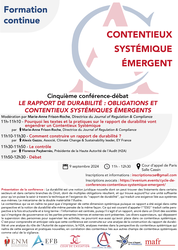
► Full Reference: Le rapport de durabilité : obligation et Contentieux Systémiques Émergents (The Sustainability Report: Emerging Systemic Obligation and Litigation), in cycle of conference-debates "Contentieux Systémique Émergent" ("Emerging Systemic Litigation"), organised on the initiative of the Cour d'appel de Paris (Paris Cour of Appeal), with the Cour de cassation (French Court of cassation), the Cour d'appel de Versailles (Versailles Court of Appeal), the École nationale de la magistrature - ENM (French National School for the Judiciary) and the École de formation des barreaux du ressort de la Cour d'appel de Paris - EFB (Paris Bar School), under the scientific direction of Marie-Anne Frison-Roche, September 19, 2024, 11h-12h30, Cour d'appel de Paris, Cassin courtroom
____
► Presentation of the conférence: Sustainability is a new legal concept, the lineaments of which can be found in certain sectors and branches of Law, and which today has both multiple resulting obligations and a definition that is sufficiently unified to allow it to be grasped through the technique and the requirement of the "sustainability report", which translates a requirement linked to the systems themselves. The dual materiality mechanism illustrates this.
The litigation that will ensue shall be imbued with this systemic dimension, since this report was required from this perspective, and the notion of sustainability itself was conceived in the same way. What is commonly referred to as "ESG" reflects this perspective, which is both structural and long-term: Information is central here, since it is a report, anchored in the new conception of Corporate Law that is imbued with Governance, where internal and external stakeholders are present. The various Supervisors, who go beyond supervising professionals to supervise activities, are also bound to have a role to play in this systemic litigation.
In order to understand and anticipate this, this conference is built around an analysis of the construction of the sustainability report and an analysis of the role of the supervisory authority, the French Audit Authority, the Haute Autorité de l'Audit - H2A. These analyses are carried out with a view to the systemic litigation that will arise from these new requirements and practices, in correlation with litigation linked to other fields of systemic litigation such as Vigilance field.
____
🧮Programme of this event:
Fith conference-debate
LE RAPPORT DE DURABILITÉ : OBLIGATION ET CONTENTIEUX SYSTÉMIQUES ÉMERGENTS
(THE SUSTAINABILITY REPORT: EMERGING SYSTEMIC OBLIGATION AND LITIGATION)
Paris Court of Appeal, Cassin courtroom
🕰️11h-11h10. 🎤Pourquoi les textes et la pratiques sur le rapport de durabilité vont engendrer un Contentieux Systémique (Why the texts and practices on sustainability reporting will give rise to Systemic Litigation), by 🕴️Marie-Anne Frison-Roche, Professor of Regulatory Law and Compliance Law, Director of the Journal of Regulation & Compliance (JoRC)
➡️read the presentation of this speech
🕰️11h10-11h30. 🎤Comment construire un rapport de durabilité ? (How to build a sustainability report?), by 🕴️Alexis Gazzo, Partner, Climate Change & Sustainability leader, EY France
🕰️11h30-11h50. 🎤Le contrôle (The control), by 🕴️Florence Peybernès, President of the Haute Autorité de l'Audit - H2A (French High Audit Authority)
🕰️11h50-12h30. Debate
____
🔴Registrations and information requests can be sent to: inscriptionscse@gmail.com
🔴For the attorneys, registrations have to be sent to the following address: https://evenium.events/cycle-de-conferences-contentieux-systemique-emergent/
⚠️The conference-debates are held in person only, in the Cour d’appel de Paris (Paris Court of Appeal).
________

June 24, 2024
Organization of scientific events
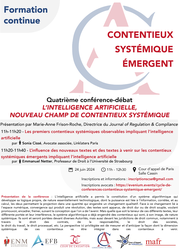
► Full Reference: L’intelligence artificielle, nouveau champ de Contentieux Systémique (Artificial intelligence, new field of Systemic Litigation), in cycle of conferences-debates "Contentieux Systémique Émergent" ("Emerging Systemic Litigation"), organised on the initiative of the Cour d'appel de Paris (Paris Cour of Appeal), with the Cour de cassation (French Court of cassation), the Cour d'appel de Versailles (Versailles Court of Appeal), the École nationale de la magistrature - ENM (French National School for the Judiciary) and the École de formation des barreaux du ressort de la Cour d'appel de Paris - EFB (Paris Bar School), under the scientific direction of Marie-Anne Frison-Roche, June 24, 2024, 11am-12.30pm, Cour d'appel de Paris, Cassin courtroom.
____
🌐see on LinkedIn the report made of this event
____
► Presentation of this conference-debate: Artificial intelligence has enabled the creation of an algorithmic system. This develops its own logic, which is essentially technological in nature. It generates computing power based on the correlation of information to produce possible causalities and build probabilities that are sometimes likened to "predictions", with the mass processed eventually generating a qualitative change.
This change is linked to the digital space itself, which by its very nature gives rise to systemic disputes and litigation, to which the conference-debate on 27 May 2024 was devoted.
There are three ways in which this Emerging Systemic Litigation is involved, and it is important to anticipate these, as the litigation is either in its infancy or still to come, but will undoubtedly arise suddenly.
Firstly, it is possible that the technological tool will make it possible to deal with certain cases where the technical nature of either the concepts or the requests, or the multitude of requests, however simple, require this ability to deal with the mass, which leads to an increase in both the mechanical power of algorithms and the greater presence of human beings, in particular through the increase in adversarial proceedings, pre-trial proceedings, mediation, etc.
Secondly, in the face of this change linked to the digital environment, 'texts' have appeared to 'regulate' the use or the very invention of this or that algorithmic tool, texts of a very diverse nature, from the most soft to the hardest (this gradation between soft and hard law is the theme taken up in the conference-debate of 19 September 2024). These may be measures taken by the firms that produce the tools, those that use them, or those that disseminate them, with the people affected by the information being relatively active. This last point explains why systemic disputes are already underway, concerning the subjective rights that would be violated either by the very nature of artificial intelligence, in this case the rights of content producers, or the rights to privacy, or protection of other Monumental Goals. The systemic and extra-territorial dimension of these disputes has already been established.
The third point is the role of Politics, since the European Union, through the texts currently being adopted, has established that the Goal is not only the sustainability of the technical system, the innovation market and European sovereignty, but also the primacy of people and individuals, through a method that is the Ex Ante ranking of risks. This conception is also contested. This methodological issue also applies to judges.
This Emerging Systemic Litigation is and will be brought before various regulatory or supervisory Authorities, but also before the administrative and judiciary courts, in particular through Contract Law, Tort Law, Company Law, Labour Law, General Procedural Law, etc.
The aim here is to measure and anticipate the way in which the systemic dimension of these disputes will be incorporated into future litigation.
____
🧮Program of this manifestation:
Fourth conference-debate
L’INTELLIGENCE ARTIFICIELLE, NOUVEAU CHAMP DE CONTENTIEUX SYSTÉMIQUE
(ARTIFICIAL INTELLIGENCE, NEW FIELD OF SYSTEMIC LITIGATION)
Paris Court of Appeal, Cassin courtroom
Presentation and moderation by 🕴️Marie-Anne Frison-Roche, Professor of Regulatory & Compliance Law, Director of the Journal of Regulation & Compliance (JoRC)
🕰️11am.-11.10am. 🎤Les deux rencontres entre l'intelligence artificielle et le Contentieux Systémique (The two meetings between Artificial Intelligence and Systemic Litigation), by 🕴️Marie-Anne Frison-Roche, Professor of Regulatory & Compliance Law, Director of the Journal of Regulation & Compliance (JoRC)
🕰️11.10am-11.30am. 🎤Les premiers contentieux systémiques observables impliquant l’intelligence artificielle (The first observable Systemic Litigations involving artificial intelligence), by 🕴️Sonia Cissé, Partner, Linklaters Paris
🕰️11.30am-11.50am. 🎤L’influence des nouveaux textes et des textes à venir sur les contentieux systémiques émergents impliquant l’intelligence artificielle (The influence of new and forthcoming legislation on Emerging Systemic Litigation involving artificial intelligence), by 🕴️Emmanuel Netter, Professor of Law at Strasbourg University
🕰️11.50am-12.30pm. Debate
____
🔴Registrations and information requests can be sent to: inscriptionscse@gmail.com
🔴For the attorneys, registrations have to be sent to the following address: https://evenium.events/cycle-de-conferences-contentieux-systemique-emergent/
⚠️The conference-debates are held in person only, in the Cour d’appel de Paris (Paris Court of Appeal).
____
🧮Read below the report made of this event by Marie-Anne Frison-Roche⤵️

May 27, 2024
Organization of scientific events

► Full Reference: Les contrôles techniques des risques présents sur les plateformes et les contentieux engendrés (Technical risks controls on platforms and disputes arising from them), in cycle of conference-debates "Contentieux Systémique Émergent" ("Emerging Systemic Litigation"), organised on the initiative of the Cour d'appel de Paris (Paris Cour of Appeal), with the Cour de cassation (French Court of cassation), the Cour d'appel de Versailles (Versailles Court of Appeal), the École nationale de la magistrature - ENM (French National School for the Judiciary) and the École de formation des barreaux du ressort de la Cour d'appel de Paris - EFB (Paris Bar School), under the scientific direction of Marie-Anne Frison-Roche, May 27, 2024, 9h-10h30, Cour d'appel de Paris, Cassin courtroom
____
🧮see the full programme of the cycle Contentieux Systémique Émergent (Emerging Systemic Litigation)
____
🌐see on LinkedIn the report of this event
____
🧱read below the report of this event⤵️
____
► Presentation of the conference: The digital space is full of risks. Some are naturally associated with it, because it is an area of freedom, while others must be countered because they are associated with generally prohibited behaviour, such as money laundering. But the digital space has developed risks which, because of their scale, have been transformed in their very nature: this is particularly true of the distortion permeating certain content and the insecurity that can threaten the entire system itself. Law has therefore entrusted operators themselves with vigilance over what have become ‘cyber-risks’, such as the risk of disinformation, the risk of destruction of communication infrastructures, and the risk of data theft, a systemic prospect that can lead to the collapse of societies themselves.
New legislations has been drafted, in particular the Digital Services Act (DSA), to increase the burdens and powers of firms in this area, with digital companies in the front line, but also supervisory authorities such as the Autorité de régulation de la communication audiovisuelle et numérique - Arcom (French Regulatory Authority for Audiovisual and Digital Communication). The resulting disputes, in which firms and regulators may be allies or opponents, are systemic in nature.
The judge's handling of these "systemic cases", through the procedure and the solutions, must respond to this systemic dimension. The "pornographic websites" case, which is currently unfolding, provides an opportunity to observe in vivo the dialogue between judges when a "systemic case" imposes itself on them.
____
🧮Programme of this event:
Third conference-debate
LES CONTRÔLES TECHNIQUES DES RISQUES PRÉSENTS SUR LES PLATEFORMES ET LES CONTENTIEUX ENGENDRÉS
(TECHNICAL RISKS CONTROLS ON PLATFORMS AND DISPUTES ARISING FROM THEM)
Paris Court of Appeal, Cassin courtroom
Moderated by 🕴️Marie-Anne Frison-Roche, Professor of Regulatory and Compliance Law, Director of the Journal of Regulation & Compliance (JoRC)
🕰️9h-9h10. 🎤Le contentieux Systémique Emergent du fait du système numériqué (Systemic Litigation Emerging from the Digital System), 🕴️Marie-Anne Frison-Roche
🕰️9h10-9h30. 🎤Les techniques de gestion du risque systémique pesant sur la cybersécurité des plateformes (The Systemic Obligation of Security on Platforms and associated Litigation), 🕴️Michel Séjean, Professor of Law at Sorbonne Paris Nord University
🕰️9h30-9h50. 🎤Un cas systémique in vivo : le cas dit des sites pornographiques (An in vivo Systemic Case: the so-called case of pornographic websites),🕴️Marie-Anne Frison-Roche
🕰️9h50-10h10. 🎤Les obligations systémiques des opérateurs numériques à travers le Règlement sur les Services Numériques (RSN/DSA) et le rôle des régulateurs (Systemic Obligations of Operators (DSA) and the role of Regulators), 🕴️Roch-Olivier Maistre, Chair of the Autorité de régulation de la communication audiovisuelle et numérique - Arcom (French Regulatory Authority for Audiovisual and Digital Communication)
🕰️10h10-10h30. Debate
____
🔴Registrations and information requests can be sent to: inscriptionscse@gmail.com
🔴For the attorneys, registrations have to be sent to the following address: https://evenium.events/cycle-de-conferences-contentieux-systemique-emergent/
⚠️The conference-debates are held in person only, in the Cour d’appel de Paris (Paris Court of Appeal).
____
🧱read below a detailed presentation of this event⤵️
________

April 26, 2024
Organization of scientific events
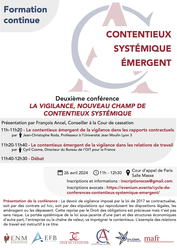
► Full Reference: La vigilance, nouveau champ de contentieux systémique (Vigilance, new field of Systemic Ligation), in cycle of conference-debates "Contentieux Systémique Émergent" ("Emerging Systemic Litigation"), organised on the initiative of the Cour d'appel de Paris (Paris Cour of Appeal), with the Cour de cassation (French Court of cassation), the Cour d'appel de Versailles (Versailles Court of Appeal), the École nationale de la magistrature - ENM (French National School for the Judiciary) and the École de formation des barreaux du ressort de la Cour d'appel de Paris - EFB (Paris Bar School), under the scientific direction of Marie-Anne Frison-Roche, 26 April 2024, 11am.-12.30am., Cour d'appel de Paris, Massé courtroom
____
🧮see the full programme of the cycle Contentieux Systémique Émergent (Emerging Systemic Litigation)
____
🌐see on LinkedIn the report of this event
____
🧱read below the report of this event⤵️
____
► Presentation of the conference: The duty of vigilance imposed by the 2017 French law is being contractualised, either by ad hoc contracts or by stipulations that reproduce the legal provisions, adjust them or go beyond them. This adoption by the Contract and Tort Law is valuable but not without risk. The systemic scope of the underlying law on the one hand and of economic structures on the other, the firm or the value chain, will permeate litigation. The example of labour relations is instructive in this respect.
____
🧮Programme of this event:
Second conference-debate
LA VIGILANCE, NOUVEAU CHAMP DE CONTENTIEUX SYSTÉMIQUE
(VIGILANCE, NEW FIELD OF SYSTEMIC LITIGATION)
Paris Court of Appeal, Massé courtroom
General presentation of the topic and moderation by 🕴️François Ancel, Judge at the Première Chambre civile de la Cour de cassation (First Civil Chamber of the French Court of cassation)
🕰️11am.-11.20am. 🎤Le contentieux émergent de la Vigilance dans les rapports contractuels (Emerging Vigilance Litigation in Contractual Relationships), by 🕴️Jean-Christophe Roda, Full Professor at Jean-Moulin Lyon 3 University
🕰️11.20am.-11.40am. 🎤Le contentieux émergent de la Vigilance dans les relations de travail (Emerging Vigilance Litigation in Employment Relationships), by 🕴️Cyril Cosme, Director of the French Office of the International Labour Organization (ILO)
🕰️11.40am.-12.30am. Debate
____
🔴Registrations and information requests can be sent to: inscriptionscse@gmail.com
🔴For the attorneys, registrations have to be sent to the following address: https://evenium.events/cycle-de-conferences-contentieux-systemique-emergent/
⚠️The conference-debates are held in person only, in the Cour d’appel de Paris (Paris Court of Appeal).
____
🧱read below a detailed presentation of this event⤵️
________

March 29, 2024
Organization of scientific events
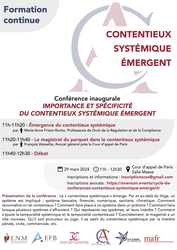
► Full Reference: Importance et spécificité du Contentieux Systémique Émergent (Importance and specificity of the Emerging Systemic Litigation), in cycle of conference-debates "Contentieux Systémique Émergent" ("Emerging Systemic Litigation"), organised on the initiative of the Cour d'appel de Paris (Paris Cour of Appeal), with the Cour de cassation (French Court of cassation), the Cour d'appel de Versailles (Versailles Court of Appeal), the École nationale de la magistrature - ENM (French National School for the Judiciary) and the École de formation des barreaux du ressort de la Cour d'appel de Paris - EFB (Paris Bar School), under the scientific direction of Marie-Anne Frison-Roche, March 29, 2024, 11h-12h30, Cour d'appel de Paris, Masse room
____
► Presentation of the conference-debate: The "Systemic Litigation" is emerging. Through and beyond the dispute, a system is involved: the banking, financial, digital, health and climate systems. How can such litigation be recognised? How do you make room for a system in a court of law? What can be done when several systems are in conflict? Who represents these systems and their interests? How can the temporality of systems and litigation be reconciled? In practical terms, the magistrate has a new role. Whether they are prosecutors or judges, they deal with systemic litigation in criminal, civil, commercial and other areas.
____
🎤see the detailed presentation of the first speech of 🕴️Marie-Anne Frison-Roche : L'émergence du Contentieux Systémique (The Emergence of Systemic Litigation)
____
🧮Programme of this event:
Inaugural Conference
IMPORTANCE ET SPÉCIFICITÉ DU CONTENTIEUX SYSTÉMIQUE ÉMERGENT
(IMPORTANCE AND SPECIFICITY OF THE EMERGING SYSTEMIC LITIGATION)
Cour d’appel de Paris (Paris Court of Appeal), Masse room
🕰️11h-11h20. 🎤L’émergence du contentieux systémique (The Emergence of the Systemic Litigation), by 🕴️Marie-Anne Frison-Roche, Professor of Regulatory and Compliance Law, Director if the Journal of Regulation & Compliance (JoRC)
🕰️11h20-11h40. 🎤L’office du magistrat du parquet dans le contentieux systémique (The role of the Public Prosecutor in Systemic Litigation), by 🕴️François Vaissette, Avocat général près la Cour d’appel de Paris (Advocate General at the Paris Court of Appeal)
🕰️11h40-12h30. Debate
____
🔴Registrations and information requests can be sent to: inscriptionscse@gmail.com
🔴For the attorneys, registrations have to be sent to the following address: https://evenium.events/cycle-de-conferences-contentieux-systemique-emergent/
⚠️The conference-debates are held in person only, in the Cour d’appel de Paris (Paris Court of Appeal).
____
🧮Read below a detailed presentation of this event⤵️
________

Feb. 9, 2024
Organization of scientific events

🌐follow Marie-Anne Frison-Roche on LinkedIn
🌐subscribe to the Newsletter MAFR Regulation, Compliance, Law
____
► Full Reference: L. Aynès, M.-A. Frison-Roche, J.-B. Racine and E. Silva-Romero (dir.), L'arbitrage international en renfort de l'obligation de Compliance (International Arbitration in support of the Compliance Obligation), Journal of Regulation & Compliance (JoRC) and Institute of World Business Law of the ICC (Institute), Conseil Économique Social et Environnemental (CESE), Paris, February 9, 2024
____
____
🏗️This symposium takes place in the cycle of symposiums organised by the Journal of Regulation & Compliance (JoRC) and its partners Universities, focusing in 2023-2024 on the general theme of the Compliance Obligation
____
📚The works will then be inserted in the books:
📕L'obligation de Compliance, to be published in the 📚Régulations & Compliance Serie, co-published by the Journal of Regulation & Compliance (JoRC) and Dalloz, published in French.
📘Compliance Obligation, to be published on the 📚Compliance & Regulation Serie, co-published by the Journal of Regulation & Compliance (JoRC) and Dalloz, published in English.
____
► General presentation of the symposium: "Compliance Obligation" appears to be far from International Arbitration if Compliance Law is only understood in terms of binding regulations or even Criminal Law. Arbitration would only have contact with Compliance Obligation in a repulsive way, when a person claims to have enforced a contract before an arbitration court that disregards a compliance prohibition, e.g. corruption or money laundering. It is therefore from a negative angle that the cross-over has taken place.
The fact that Arbitration Law respects the requisite of Criminal Law is nothing new. Moreover, the power of Compliance in its detection and prevention tools, particularly in terms of evidence, no doubt increases the global efficiency.
But Compliance Obligation is based on Monumental Goals, notably linked to global human rights and active ambitions about environment and climate which, particularly in the value chain economy, take the legal form of compliance clauses, or even compliance contracts, or various commitments and plans, which the parties can ask the international arbitrator to enforce. They will do so even more as arbitrators are often the only international, or even global, judges available.
The use they will do of Contract Law, Quasi-Contract Law, Enforcement Law, Tort Law, reinforces Compliance Law in a global dimension.
____
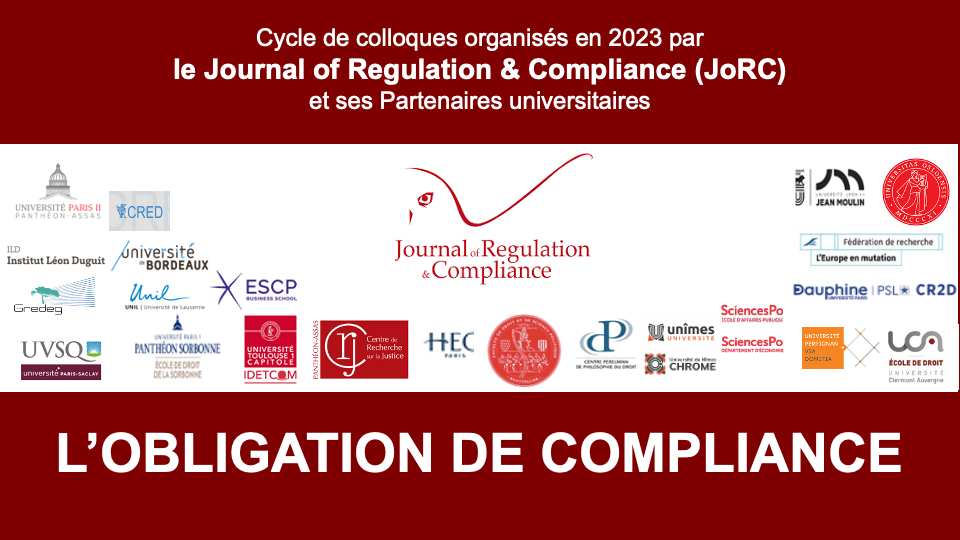
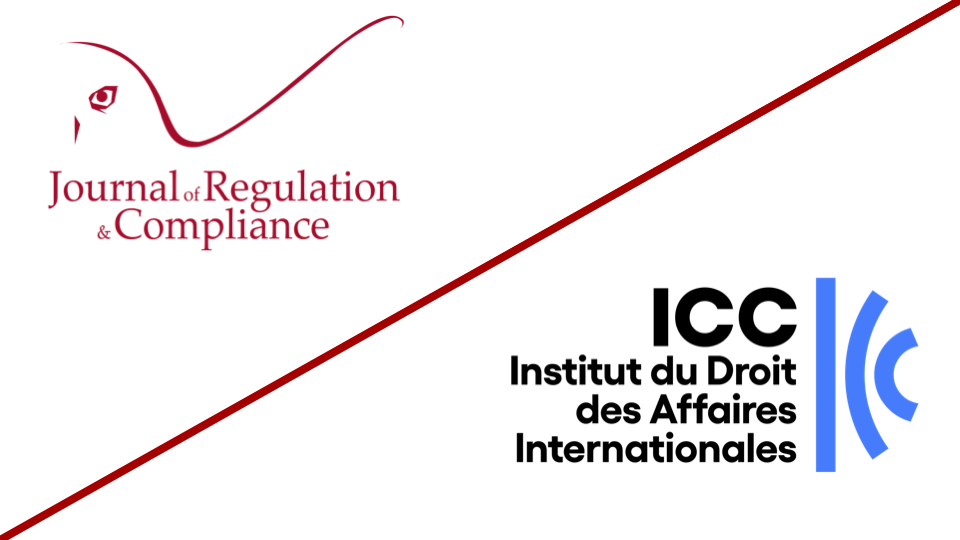
____
► Interviennent :
🎤 Laurent Aynès, emeritus Professor at Paris 1 Panthéon-Sorbonne University, Attorney, Darrois Villey Maillot Brochier (Paris)
🎤 Marie-Anne Frison-Roche, Professor of Regulatory and Compliance Law, Director of the Journal of Regulation & Compliance (JoRC)
🎤 Jean-François Guillemin, former General Secretary of the Bouygues Group
🎤 Christophe Lapp, Attorney, Advant Altana (Paris)
🎤 Jean-Baptiste Racine, Full Professor at Paris Panthéon-Assas University (Paris 2)
🎤 Eduardo Silva-Romero, President of the Institute of World Business Law of the ICC (Institute), Attorney, Wordstone (Paris)
____
🧮Read a detailed presentation of the event below⤵️

Jan. 12, 2024
Organization of scientific events
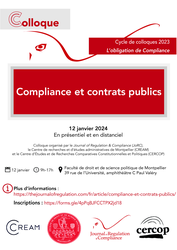
🌐follow Marie-Anne Frison-Roche on LinkedIn
🌐subscribe to the Newsletter MAFR Regulation, Compliance, Law
____
► Full Reference: M.-A. Frison-Roche, C. Gilles and A. Oumedjkane (dir.), Compliance et contrats publics (Compliance and public contracts), Journal of Regulation & Compliance (JoRC), Centre de recherches et d’études administratives de Montpellier (CREAM) and Centre d’Études et de Recherches Comparatives Constitutionnelles et Politiques (CERCOP) of the Montpellier University, Faculté de droit et de science politique de Montpellier, January 12, 2024
____
🌐consult a general presentation of this event on LinkedIn, linking to a presentation of each speech (in French)
____
🏗️This symposium takes place in the cycle of symposiums organised by the Journal of Regulation & Compliance (JoRC) and its partners Universities, focusing in 2023-2024 on the general theme of the Compliance Obligation
____
📚The works will then be inserted in the books:
📕Compliance et contrat, to be published in the 📚Régulations & Compliance Serie, co-published by the Journal of Regulation & Compliance (JoRC) and Dalloz, published in French.
📘Compliance & Contract, to be published on the 📚Compliance & Regulation Serie, co-published by the Journal of Regulation & Compliance (JoRC) and Dalloz, published in English.
____
► General presentation of the symposium: Compliance is developing throughout the legal system, through both Public and Private Law techniques. Public Contract Law bears witness to this in two ways: through its scope, in that Compliance applies to economic relationships entered into by public bodies, and through its object, which internalises a reconciliation between their economic interests and a set of other general interest objectives, or "Monumental Goals", a reconciliation for which public bodies have traditionally been responsible. In addition to unilateral acts, contracts have their rightful place as a practical means of achieving this reconciliation. Its flexibility allows for negotiation and adjustment of the burdens to be placed on the co-contracting parties.
The aim of this symposium is to link the different manifestations of the Compliance Obligation in public contracts and thus give coherence to policies which are still too often considered in a watertight manner because they relate to very different aims and areas.
Firstly, at the procurement stage, the promotion of responsible or innovative procurement, particularly from an environmental point of view, is one of the signs of Compliance's presence. On a completely different note, the same is true of the CJEU's challenge to the automatic application of bans on tendering, which prevent contracting authorities from ruling on a candidate's reliability by taking into account the compliance programmes implemented by companies since their conviction.
Secondly, at the litigation stage, the Conseil d'État's (French Council of State) recent broad recognition of the illegality of an administrative contract on the grounds of a breach of ethical obligations has tempered the drive to make contracts more secure, drawing the consequences of the major drive for transparency in public life that has been underway since 2013.
The aim of the morning session will be to understand the various forms of the Compliance Obligation in public contracts. This overview will make it possible, in the afternoon, to aim to unify the Compliance Obligation in public contracts.
____

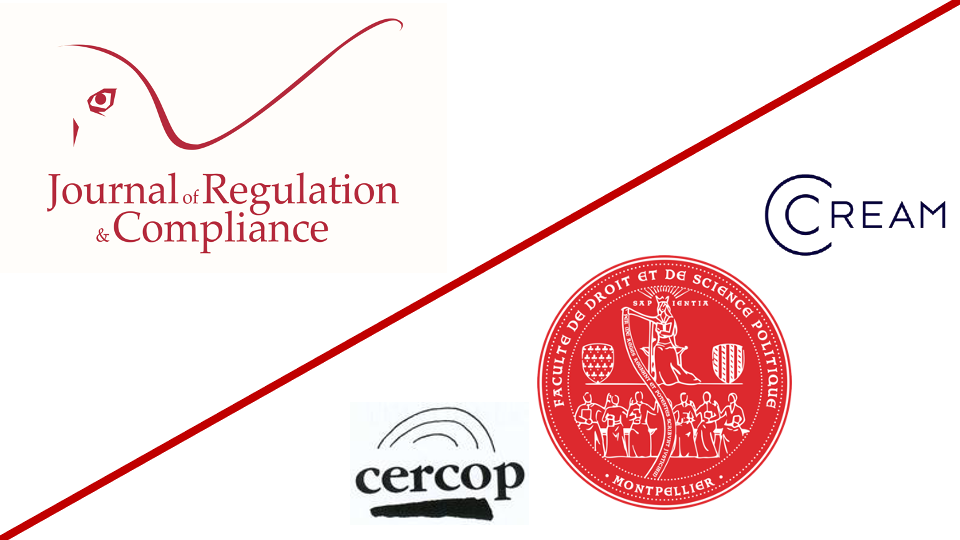
____
► Speakers:
🎤Ugo Assouad, PhD student at the Montpellier University, CREAM
🎤Philippe Augé, President of the Montpellier University
🎤Clémence Ballay-Petizon, PhD student at the Montpellier University, CREAM
🎤Yannisse Benrahou, PhD student at Paris-Nanterre University, CRDP
🎤Léon Boijout, PhD student at the Montpellier University, CREAM
🎤Julien Bonnet, Full Professor at the Montpellier University, CERCOP
🎤Guylain Clamour, Dean of the Montpellier Faculty of Law and Political Science
🎤Marie-Anne Frison-Roche, Professor of Regulatory and Compliance Law, Director of the Journal of Regulation & Compliance (JoRC)
🎤Pierre-Yves Gadhoun, Professor at the Montpellier University, CERCOP
🎤Pascale Idoux, Professor at the at the Montpellier University, CREAM
🎤Nedjma Kontoukas, PhD student at the Montpellier University, CREAM
🎤Valentin Lamy, Senior Lecturer at the Lorraine University, IRENEE
🎤Antoine Oumedjkane, Senior Lecturer at Lille University, ERDP
🎤Lucien Rapp, Emeritus Professor at Toulouse Capitole University
🎤Marion Ubaud-Bergeron, Full Professor at the Montpellier University, CREAM
____
🧮Read a detailed presentation of the event below⤵️

Dec. 5, 2023
Organization of scientific events
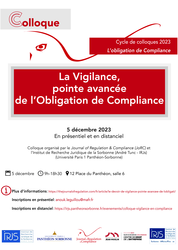
► Référence complète : M.-A. Frison-Roche, M. Mekki et J.-Ch. Roda (dir.), La Vigilance, pointe avancée de l'Obligation de Compliance, Journal of Regulation & Compliance (JoRC), Institut de Recherche Juridique de la Sorbonne (André Tunc - IRJS), Université Paris 1 Panthéon-Sorbonne, 5 décembre 2023.
____
🏗️Ce colloque s'inscrit dans le cycle de colloques organisé par le Journal of Regulation & Compliance (JoRC) et ses Universités partenaires, portant en 2023 sur le thème général de L'Obligation de Compliance.
____
📚Les travaux s'inséreront ensuite dans les ouvrages :
📕L'obligation de Compliance, à paraître dans la collection 📚Régulations & Compliance, coéditée par le Journal of Regulation & Compliance (JoRC) et Dalloz, publié en langue française.
📘Compliance Obligation, à paraître dans la collection 📚Compliance & Regulation, coéditée par le Journal of Regulation & Compliance (JoRC) et Bruylant, publié en langue anglaise.
____
► Présentation générale du colloque : L'Obligation de Vigilance est difficile à cerner à travers la multiplicité des textes et les cas dans lesquels on peut l'appréhender. Cela est particulièrement perceptible à travers le mécanisme de Vigilance qui tout à la fois illustre, voire force le trait, de l'Obligation de Vigilance. A travers les textes internationaux, la loi française et les textes européens adoptés ou en gestation, les contraintes de vigilance, mais aussi les structures et actions mises en place que les entreprises ont organisé ainsi que les actions que les parties prenantes ont engagé, la Vigilance a mis en lumière des aspects de l'Obligation de Compliance, voire a modifié celle-ci.
L'effet de révélation ainsi produit et le mouvement ainsi déclenché, dont les racines sont profondes et les effets systémiques très importants, justifient que l'on cerne davantage des mécanismes qui sont articulés entre eux alors qu'ils sont parfois perçus en silo, ce qui rend difficile la compréhension d'ensemble. De la même façon, parce que la Vigilance est la pointe avancée de l'Obligation de Compliance, l'on peut ainsi mieux distinguer et articuler ce qui relève des spécificités sectorielles, notamment en matière bancaire et financière ou bien en matière numérique, et les articuler avec ce que la Vigilance a, comme la Compliance, de plus général. Plus encore, l'intensité de la Vigilance varie selon les ambitions quelle porte et selon la position de l'entreprise assujettie, ce que traduisent les variations de qualification juridique qui vont du devoir à l'obligation pénalement sanctionnée.
Les différents systèmes juridiques traduisent ces évolutions dans leur loi, leur jurisprudence et la pratique des entreprises et des parties prenantes de façon spécifique car ces différents techniques expriment des normes de comportement et de reddition de comptes dont les exigences probatoires, les conceptions de la responsabilité et les traductions institutionnelles à travers de possibles organes de régulation sont la traduction directe.
En conséquence, le colloque est construit en trois temps. Après une Introduction générale sur les rapports systémiques entre la Vigilance et la Compliance, une première partie porte sur la variation des Intensités de la Vigilance, pointe avancée de la Compliance, une deuxième partie porte sur les Tensions que la Vigilance engendre ou exacerbe, une troisième partie porte sur les Modalités que la Vigilance emprunte dans les systèmes de Compliance.
____

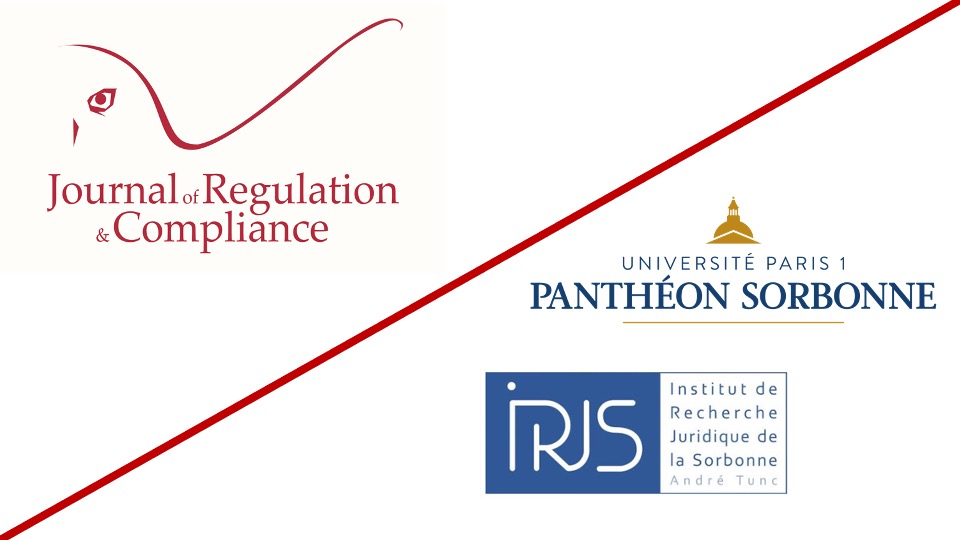
____
► Interviennent :
🎤Laurence Dubin, Professeure à l'Université Paris 1 Panthéon-Sorbonne
🎤Marie-Anne Frison-Roche, Professeure de Droit de la Régulation et de la Compliance, directrice du Journal of Regulation & Compliance (JoRC)
🎤Bernard Haftel, Professeur à l'Université Paris-Nord
🎤Marie Lamoureux, Professeure à Aix-Marseille Université
🎤Grégoire Loiseau, Professeur à l'Université Paris 1 Panthéon-Sorbonne
🎤Véronique Magnier, Professeure à l'Université Paris-Saclay
🎤Gilles J. Martin, Professeur émérite à l'Université Côte d'Azur, membre du Groupe de Recherche en Droit, Économie, Gestion (GREDEG) du CNRS
🎤Mustapha Mekki, Professeur à l'Université Paris 1 Panthéon-Sorbonne
🎤Jean-Christophe Roda, Professeur à l'Université Jean Moulin Lyon 3
🎤Anne-Claire Rouaud, Professeure à l'Université Paris 1 Panthéon-Sorbonne
____
Lire une présentation détaillée de la manifestation ci-dessous⤵️

Nov. 30, 2023
Organization of scientific events
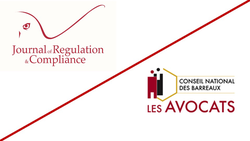
► Référence complète : M. Boissavy, H. Dehghani-Azar et M.-A. Frison-Roche (dir.), Journal of Regulation & Compliance (JoRC) et Conseil national des barreaux (CNB), Compliance, Vigilance et Médiation, Auditorium de la Maison du Barreau, 30 novembre 2023
____
► Présentation générale du colloque : Pour accroître le respect des droits humains et de l’environnement dans le cadre de la responsabilité sociale des entreprises et de la compliance, les pouvoirs publics et les entreprises mettent en œuvre depuis plusieurs années des instruments et processus de dialogue entre l’entreprise d’une part et les parties prenantes internes et externes à l’entreprise d’autre part. Parmi eux la médiation est régulièrement mise en avant comme étant un processus nécessaire et fécond pour trouver des accords bénéfiques tant pour les salariés et les acteurs de la société civile que pour l’environnement et la société globale.
John Ruggie, Représentant spécial du Secrétaire général chargé de la question des droits de l’Homme et des sociétés transnationales et autres entreprises, dans son rapport du 21 mars 2011, Principes directeurs relatifs aux entreprises et aux droits de l'homme, recommande la médiation comme mécanisme de réclamation non judiciaire efficace et approprié. La norme ISO 26000 sur la responsabilité sociétale vise aussi explicitement le recours à la médiation au point « Actions et attentes associées » (6.3.2.6) en ces termes : « il convient qu’une organisation établisse des mécanismes de recours pour son propre usage et pour celui des parties prenantes, ou qu’elle en assure la disponibilité. Pour que ces mécanismes soient efficaces, il convient qu’ils soient […] fondés sur le dialogue et la médiation : il convient que le processus vise à remédier aux atteintes à l’aide de solutions mutuellement acceptées, obtenues par un dialogue entre les parties. Lorsqu’un jugement est souhaitable, il convient que les parties conservent le droit d’y parvenir au moyen de mécanismes distincts, indépendants ».
De la même façon, la loi n°2017-399 du 21 mars 2017 relative au devoir de vigilance des sociétés mères et des entreprises donneuses d’ordre suscite des contentieux relatifs à la conception et à l’application de plans de vigilances de certaines entreprises assujetties. Le recours à la médiation a été proposé par le juge, parfois accepté et l’on sait que certaines ont réussi.
Parallèlement, le projet de directive européenne sur le devoir de vigilance des entreprises en matière de durabilité (dite CS3D pour Corporate Sustainability Due Diligence Directive) est de nature, à faire peser ou à étendre pour un grand nombre d’entreprises de l’Union Européenne des obligations au titre du devoir de vigilance pour le respect des droits de l’homme et l’environnement par les entreprises dans les chaînes de valeur mondiales.
Il résulte de tout cela que lee respect des droits de l’Homme au sein des organisations et entreprises repose le recours aux juridictions, sur des processus de coopération comme peut l’être la médiation, tant celle de projet que celle spécifique à la résolution des différends, dans le même temps que le recours juridictionnel ne suffira pas à rendre rapidement efficace le respect de ces obligations.
Le législateur et les parties concernées en sont conscientes et elles évoquent le recours à la médiation comme nécessaire pour aider tant les acteurs de la société civile engagés pour le respect des droits humains et de l’environnement que les entreprises à trouver des accords pour le respect de ces obligations.
Les avocats, médiateurs, personnes assistant les parties prenantes et les entreprises, ont un rôle important à jouer pour le succès de ces médiations.
Le Conseil national des barreaux organise, en collaboration avec le Journal of Regulation and Compliance (JoRC), un colloque d’une demi-journée « Compliance, vigilance et médiation » pour former les avocats à cette activité qui va se développer soit en prolongement d’une activité soit en activité propre et qui a des implications importantes tant pour les droits de chacun, la société que pour l’environnement.
____
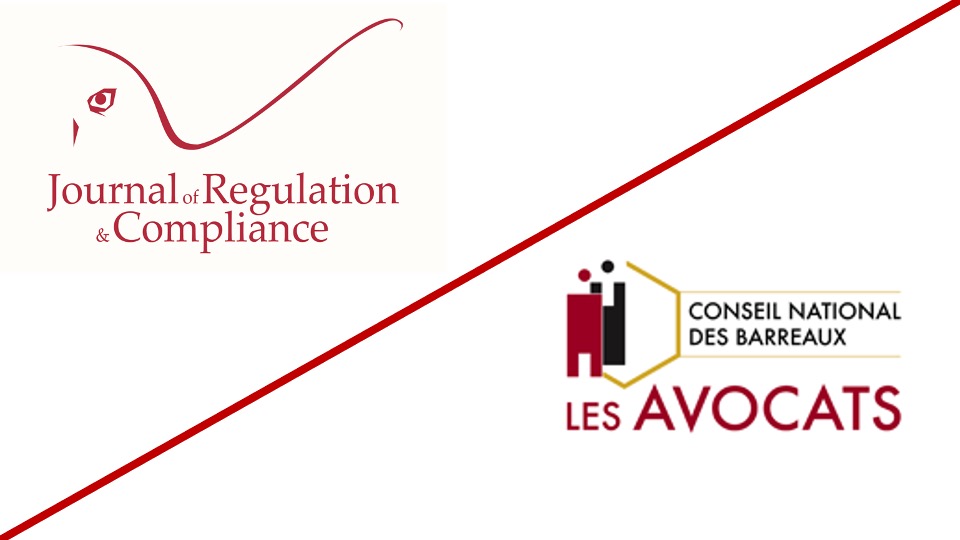
____
► Interviennent :
🎤Matthieu Boissavy, avocat au Barreau de Paris, vice-président de la Commission Liberté et droits de l'homme du CNB
🎤Matthieu Brochier, avocat au Barreau de Paris
🎤Stéphanie Brunengo, avocate au Barreau d'Aix-en-Provence, médiatrice
🎤Malik Chapuis, juge à la 3ième chambre civile du Tribunal judiciaire de Paris
🎤Lucie Chatelain, responsable contentieux et plaidoyer SHERPA
🎤Bruno Deffains, professeur à l'Université Paris Panthéon-Assas
🎤Hirbod Dehghani-Azar, avocat au Barreau de Paris, président de la Commission Modes alternatifs de règlements des Règlements (MARD) du CNB
🎤Marie-Anne Frison-Roche, professeure de Droit de la Régulation et de la Compliance, directrice du Journal of Regulation & Compliance (JoRC)
🎤Jérôme Gavaudan, président du CNB
🎤Thibault Goujon-Bethan, professeur à l'Université Jean Moulin Lyon 3
🎤Céline Haye Kioussis, directrice juridique du Groupe BPCE
🎤Laurence Joly, avocate au Barreau de Thonon-les-Bains
🎤Stéphane de Navacelle, avocat au Barreau de Paris
🎤Lori Roussey, Data Protection Officer, fondatrice et Directrice de Data Rights
🎤Stephanie Smatt Pinelli, directrice juridique Contentieux, groupe Orano
____
Lire une présentation détaillée de la manifestation ci-dessous⤵️

June 13, 2023
Organization of scientific events
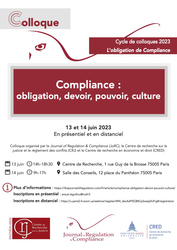
► Référence complète : B. Deffains, M.-A. Frison-Roche et J.-B. Racine (dir.), Journal of Regulation & Compliance (JoRC), Centre de recherche sur la justice et le règlement des conflits (CRJ) et Centre de recherche en économie (CRED) de l'Université Paris Panthéon-Assas (Paris II), Compliance : Obligation, devoir, pouvoir, culture, Université Paris Panthéon-Assas, 13 et 14 juin 2023.
____
🏗️Ce colloque s'inscrit dans le cycle de colloques organisé par le Journal of Regulation & Compliance (JoRC) et ses Universités partenaires, portant en 2023 sur le thème général de L'Obligation de Compliance.
____
📚Les travaux s'inséreront ensuite dans les ouvrages :
📕L'obligation de Compliance, à paraître dans la collection 📚Régulations & Compliance, coéditée par le Journal of Regulation & Compliance (JoRC) et Dalloz, publié en langue française.
📘Compliance Obligation, à paraître dans la collection 📚Compliance & Regulation, coéditée par le Journal of Regulation & Compliance (JoRC) et Bruylant, publié en langue anglaise.
____
► Présentation générale du colloque : "L'obligation" est au cœur de bien des disciplines. Les techniques de compliance prennent très souvent la forme d'obligations. Mais pour ne mentionner que les premières interrogations qui viennent à l'esprit et dans les cas, notamment ceux qui sont posés aux juridictions, c'est paradoxalement assez peu le "Droit des obligations" qui a été utilisé, le Droit de la Compliance étant d'une part assez souvent assimilé à la "réglementation", et son unilatéralité, comme le fût le Droit de la Régulation, branche du Droit qu'il prolonge, d'autre part on lui a souvent associé l'éthique, la morale, une culture partagée, tout ce qui semble mettre en distance de l'obligation. Les notions de "devoir" et d'"engagement", prennent de plus en plus place dans le Droit de la Compliance, avec une portée encore incertaine. C'est pourquoi, au-delà de la multiplicité des "obligations de compliance", l'on peut se demander s'il existe une "obligation de compliance", quelle serait sa définition et son rapport avec tout ce qui, dans le Droit de la Compliance, ne serait pas une obligation.
____

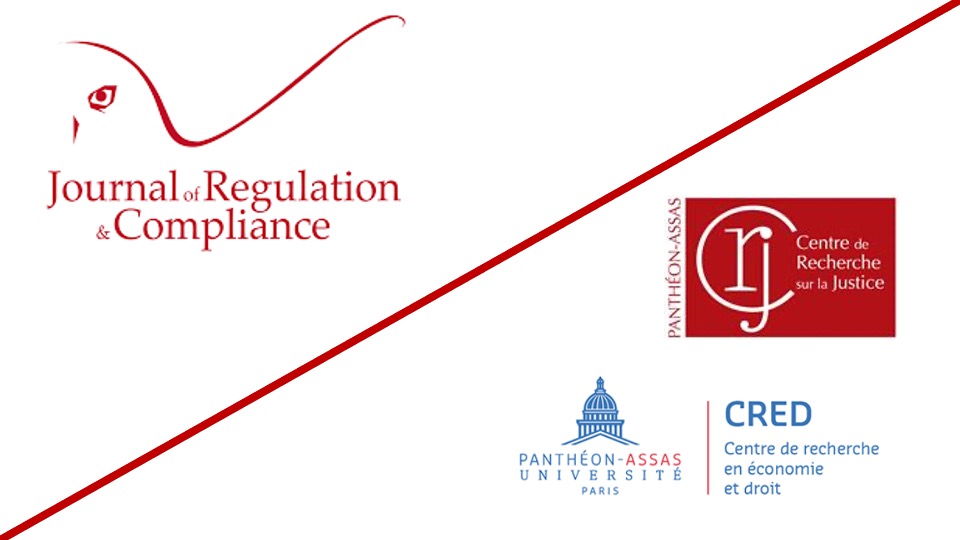
____
► Interviennent :
🎤Jean-Sébastien Borghetti, professeur à l'Université Panthéon-Assas (Paris II)
🎤Louis d'Avout, professeur à l'Université Paris Panthéon-Assas (Paris II)
🎤Bruno Deffains, professeur d'économie du Droit, Université Panthéon-Assas (Paris II)
🎤Marie-Anne Frison-Roche, professeur de Droit de la Régulation et de la Compliance, directrice du Journal of Regulation & Compliance (JoRC)
🎤Daniel Gutmann, professeur à l'Ecole de Droit de l'Université Panthéon-Sorbonne (Paris I)
🎤Anne-Valérie Le Fur, professeure à l'Université Paris-Saclay
🎤Gilles Lhuilier, professeur à l'ENS de Rennes, directeur du département Droit, Economie, Gestion
🎤Etienne Maclouf, professeur en sciences de gestion à l'Université Panthéon-Assas (Paris II)
🎤Jean-Baptiste Racine, professeur de Droit, Université Panthéon-Assas (Paris II)
🎤René Sève, directeur de l'Association française de philosophie du droit (AFPD) et des Archives de Philosophie du Droit (APD)
🎤Marta Torre-Schaub, directrice de recherches au CNRS, Institut des sciences juridique et philosophique de la Sorbonne, Université Panthéon-Sorbonne (Paris I)
____
Lire une présentation détaillée de la manifestation ci-dessous⤵️

April 7, 2023
Organization of scientific events
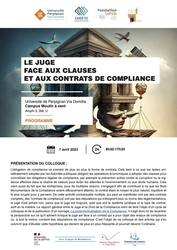
► Référence complète : Walid Chaiehloudj et M.-A. Frison-Roche (dir.), Journal of Regulation & Compliance (JoRC) et Faculté de Droit de Perpignan, Le juge face aux clauses et aux contrats de compliance, Faculté de droit de Perpignan, 7 avril 2023
____
🏗️Ce colloque s'inscrit dans le cycle de colloques organisé par le Journal of Regulation & Compliance (JoRC) et ses Universités partenaires, portant en 2023 sur le thème général de L'Obligation de Compliance.
____
📚Les travaux s'inséreront ensuite dans les ouvrages :
📕Contrat et Compliance, à paraître dans la collection 📚Régulations & Compliance, coéditée par le Journal of Regulation & Compliance (JoRC) et Dalloz, publié en langue française.
📘Compliance & Contract, à paraître dans la collection 📚Compliance & Regulation, coéditée par le Journal of Regulation & Compliance (JoRC) et Bruylant, publié en langue anglaise.
____
► Présentation générale du colloque : L'obligation de compliance va prendre de plus en plus la forme de contrats. Cela tient à ce que les textes unilatéralement adoptés par les Autorités publiques obligent les opérateurs économiques à adopter des clauses pour concrétiser les obligations légales de compliance, par exemple la prévention active contre la corruption ou la vigilance effective dans la chaîne de valeurs pour éviter les atteintes à l'environnement ou aux droits humains. Cela vient aussi du fait que les entreprises, pour de multiples raisons, s'engagent afin de contribuer à ce que les Buts Monumentaux de la Compliance soient efficacement atteints, le contrat étant le moyen le plus naturel, équilibré et le plus souple pour y parvenir.
De cette activité contractuelle multiple, qui peut se manifester soit par des contrats complets, des "contrats de compliance", soit par des stipulations qui s'éloignent plus ou moins des réglementations, le juge n'est jamais loin, parce que le juge est toujours, quel que soit le système juridique et le type de contrat, actif en la matière.
Le rapport général entre le Juge et le Droit de la Compliance vient de faire l'objet d'un cycle de colloques et de la publication d'un ouvrage, La juridictionnalisation de la Compliance. Il s'agit donc ici de recentrer la perspective sur ce qu'il advient lorsque le juge est face à un contrat qui a pour objet des enjeux de compliance ou, à tout le moins, contient des stipulations de compliance.
C'est l'objet de ce colloque et des articles qui s'en suivront que d'étudier cette hypothèse qui devient de plus en plus fréquente et pourrait devenir l'ordinaire.
____

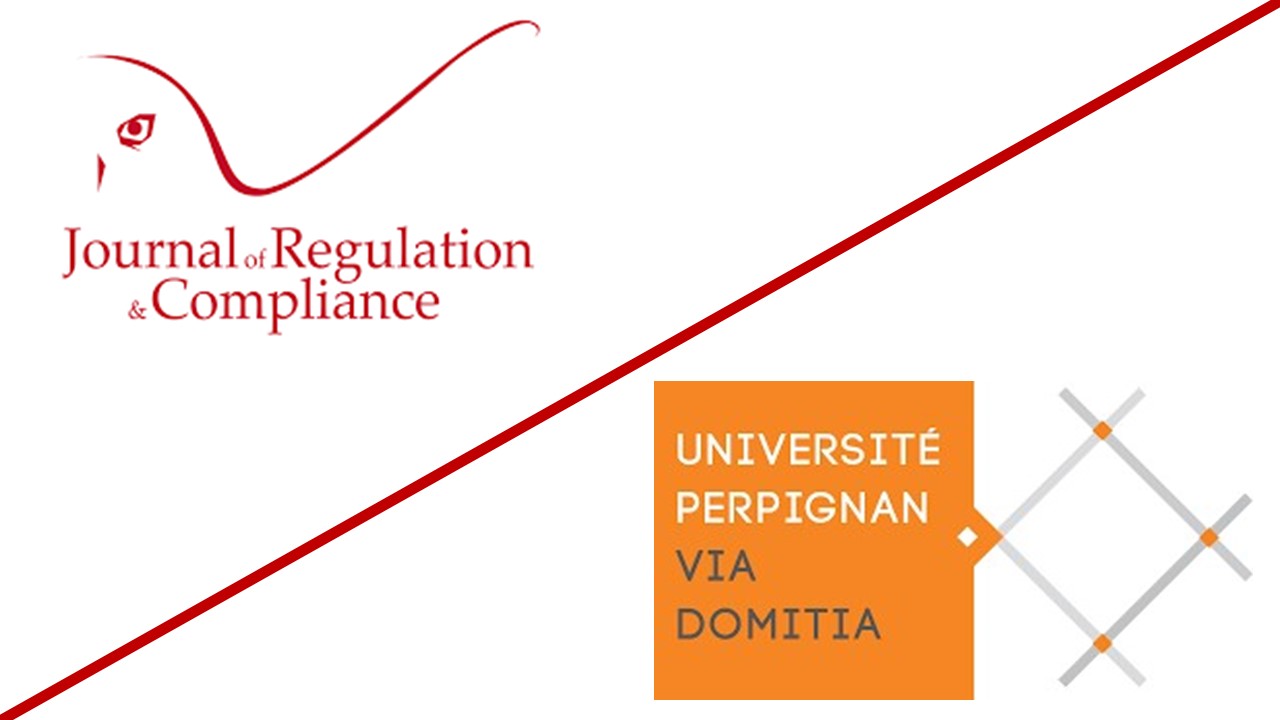
____
► Interviennent :
🎤 Sarah Andjechairi-Tribillac, maître de conférences à l'Université de Perpignan
🎤 Jean-Baptiste Barbieri, maître de conférences à l'Université Paris Panthéon-Assas (Paris 2)
🎤 Walid Chaiehloudj, professeur à la Faculté de Droit de Perpignan
🎤 Marie-Anne Frison-Roche, professeur de Droit de la Régulation et de la Compliance, directrice du Journal of Regulation & Compliance (JoRC)
🎤 Thibault Goujon-Bethan, professeur à l'Université Jean Moulin Lyon 3
🎤 Nicolas Ida, maître de conférences à Aix-Marseille Université
🎤 Hania Kassoul, maître de conférences à l'Université Côté d'Azur
🎤 Rebecca Legendre, professeur à l'Université de Nanterre
🎤 Grégoire Leray, professeur à l'Université Côté d'Azur
🎤 Yves Picod, professeur émérite à l'Université de Perpignan
🎤 Marc Segonds, professeur à l'Université Toulouse Capitole
🎤 Sandrine Tisseyre, professeure à l'Université Toulouse Capitole
🎤 Antoine Touzain, professeur à l'Université de Rouen
____
Lire une présentation détaillée de la manifestation ci-dessous⤵️

Feb. 2, 2023
Organization of scientific events
► Full reference: M.-A. Frison-Roche, co-organisation de la formation ENM Droit de la Compliance, co-organisé entre l'École nationale de la magistrature et le Journal of Regulation & Compliance (JoRC), les 2 et 3 février 2023.
____
► General presentation of the course: The two-day session is designed for magistrates and practicing lawyers who are not necessarily specialized, to enable them, based on concrete cases, to understand the issues, objectives, and methods of compliance mechanisms in companies, including the increasing judicialization and the supranational dimension strengthen, modifying the office of the judge and the role of lawyers.
The analysis is made from the angle of Civil Law (contract, tort), Company Law, Labor Law and Criminal Law, but also governance, financial markets, regulatory, climate and digital issues.
____
► Brief bibliography:
- M.-A. Frison-Roche (dir.), Compliance Jurisdictionalisation, coll. "Régulations & Compliance", Journal of Regulation & Compliance (JoRC) and Dalloz, 2023.
- M.-A. Frison-Roche (dir.), Compliance Monumental Goals, coll. "Régulations & Compliance", Journal of Regulation & Compliance (JoRC) and Dalloz, 2022.
- M.-A. Frison-Roche (dir.), Compliance Tools, coll. "Régulations & Compliance", Journal of Regulation & Compliance (JoRC) and Dalloz, 2021.
- N. Borga, J.-Cl. Marin, J.-Ch. Roda (dir), Compliance : l'entreprise, le régulateur et le juge, coll. Régulations & Compliance, Journal of Regulation & Compliance (JoRC) and Dalloz, 2018.
- M.-A. Frison-Roche (dir.), Pour une Europe de la Compliance, coll. "Régulations & Compliance", Journal of Regulation & Compliance (JoRC) and Dalloz, 2019.
- M.-A. Frison-Roche (dir.), Régulation, Supervision, Compliance, coll. "Régulations", Journal of Regulation & Compliance (JoRC) and Dalloz, 2017.
____
► Will speak:
🎤François Ancel, Judge at the Première chambre civile de la Cour de cassation ( First civil chamber of the Court of Cassation)
🎤Guillaume Beaussonie, Professor at Toulouse 1 Capitole University
🎤Jean-François Bohnert, Procureur national financier
🎤Gilles Briatta, Group General Secretary of the Groupe Société Générale
🎤Marie-Anne Frison-Roche, Director of the Journal of Regulation & Compliance (JoRC)
🎤Cécile Granier, senior lecturer at Jean-Moulin Lyon 3 University
🎤Jean-Michel Hayat, Premier Président honoraire de la Cour d'appel de Paris
🎤Christophe Ingrain, Avocat à la Cour
🎤Anne-Valérie Le Fur, Professor at Versailles Saint-Quentin-en-Yvelines University
🎤Stanislas Pottier, Senior Advisor to the General Management of Amundi
🎤Jean-Baptiste Racine, Professeur à l'Université Panthéon-Assas (Paris II)
🎤Juliette Thery, Membre du Collège de l'Arcom
____
Lire une présentation détaillée de la manifestation ci-dessous⤵️
Jan. 19, 2022
Organization of scientific events

► Full Reference: Frison-Roche, M.-A., coordination and moderation of the conference L'office du juge et les causes systémiques (""The Office of the Judge and systemic causes"), in Cycle of Conferences, Penser l'office du juge ("Thinking the Office of the Judge"), Grand Chamber of the Cour de cassation, Paris, May 9, 2021, 17h-19h.
The conference is held in French.
____
► General presentation of the conference: the conference is based on the intervention of three judges, Christophe Soulard, Fabien Raynaud, and François Ancel, who think and debate among themselves on a hypothesis: the existence of "systemic causes". The hypothesis is that beyond and through the diversity of disputes and cases that are submitted to the most diverse judges, there is a category of cases that are systemic, which means containing in what is submitted to the judge for resolution a system. If such a category exists, which also raises the question of the diversity of systems and the difficulty arising from their submission to rules that are not legal (for example economic, biological, financial "laws", etc.) , then the judge should take this into account, both in the procedure and in the judgment they make on the case and in the way they formulate et restitute this judgment.
____
📝read the presentation of this conference by the Cour de cassation (in French)
📝read the program of the cycle of conferences 2022 (in French)
____
🎥see the conference video (in French)
🎥 see the synthesis video of the conference, made in situ by Marie-Anne Frison-Roche (in French)
____
✏️read the notes taken during the conference to make the synthesis (in French)
📝read the article of Marie-Anne Frison-Roche restituting this conference, published in the Recueil Dalloz (in French)
____
►read the works, basis of the two interventions of Marie-Anne Frison-Roche
🚧 L'hypothèse de la "cause systémique (made before the conference to prepare it), available en English
📝Synthese of the conference (made during the conference)
________

Sept. 15, 2021
Organization of scientific events
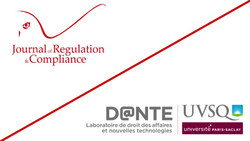
► co-organized between Laboratoire DANTE and the Journal of Regulation & Compliance (JoRC), this colloquium) is the core manifestation of the 2021 series of colloquia devoted to the general theme of Compliance Monumental Goals.
It will take place on 16th of September 2021, at the Maison du Barreau, in Paris.
This first work is in French but will be the basis of the book in English : Compliance Monumental Goals,

► Presentation of the colloquium Thematic: To understand the notion of "Monumental Goals", it is firstly necessary to take crossed perspectives on them, particularly through the prism of Labor Law, Environmental Law and Enterprise Law. Many questions appear. Does the notion of “Monumental Goals” present any substance in Law? Is it uniformly understood, or do specificities appear, forged by specific cultures and disciplinary practices? What are the sources and implicit references or echoes? Because even if we admit the part of novelty, there is undoubtedly an anchoring in traditional legal concepts, like the general interest or sovereignty. How does the shift from meta-legal (prima facie introduced by the concept) to legal take place, and where do any operational difficulties lie when legal actors are called upon to act? The question of a possible categorization of "Monumental Goals" will thus be explored, through these three legal disciplines whose historicity, goals and implications for firms differ.
These reflections allow to ask why and how these "Monumental Goals" are developed. Indeed, what is the relevance of the association of "Monumental Goals" and Compliance? Beyond theoretical considerations relating to the meaning of Law, is this really an effective alloy encouraging companies to behave differently? By what ways? These questions arise in particular with regard to the imperatives of legal certainty and the operative nature of the concept. The question of "Monumental Goals" will thus be explored by the operational actors of compliance, both those who act within companies and those who act from the lato sensu State sphere, for understanding whether this notion is a pure rhetoric figure or constitutes a particularly promising lever for the evolution of market behavior.
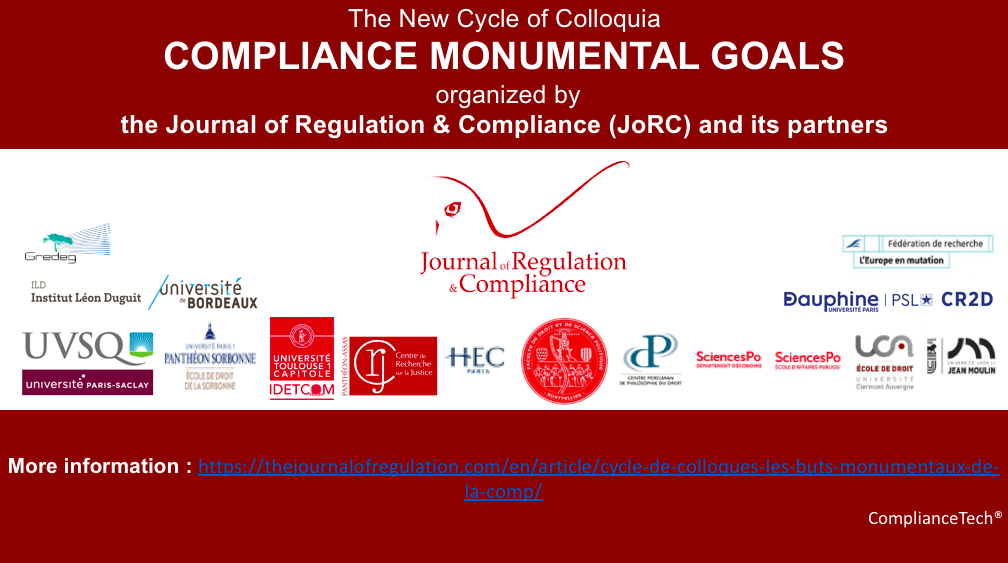
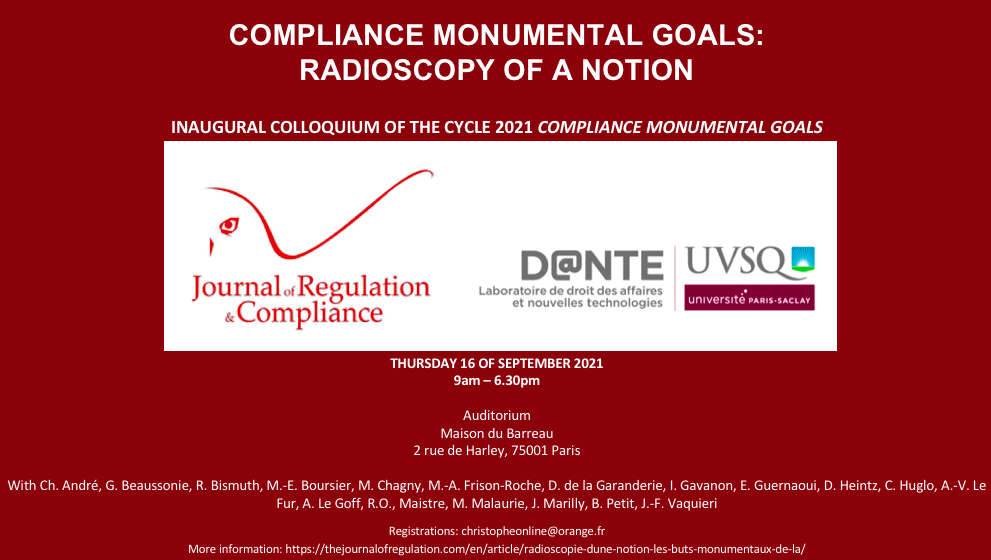
► with :
🎤 Christophe André, maître de conférences à l'Université Paris - Saclay (lecturer at the Paris-Saclay University)
🎤 Guillaume Beaussonie, professeur à l'Université Toulouse-1-Capitole (law professor at Toulouse-1-Capitole University)
🎤 Regis Bismuth, professeur de droit à Sciences po, Paris (law professor at Sciences po Paris)
🎤 Marie-Emma Boursier, doyen de l'Université Paris - Saclay (dean of the Paris-Saclay University)
🎤 Muriel Chagny, professeur l'Université Paris - Saclay, directrice du Laboratoire Dante (Professor at the Paris-Saclay University, director of the Laboratory Dante)
🎤 Marie-Anne Frison-Roche, professeur à Sciences po (Paris) (Professor at Sciences Po Paris)
🎤 Isabelle Gavanon, avocate à la Cour d'Appel de Paris (attorney before the Paris Court of Appeal)
🎤 Emma Guernaoui, ATER à l'Université Paris II Panthéon-Assas (ATER at Paris II Panthéon-Assas University)
🎤 Dominique Heintz, avocat à la Cour d' appel de Paris (attorney before the Paris Court of Appeal)
🎤 Christian Huglo, avocat à la Cour d' appel de Paris (attorney before the Paris Court of Appeal)
🎤Dominique de La Garanderie, avocat à la Cour d'appel de Paris (attorney before the Paris Court of Appeal)
🎤 Anne-Valérie Le Fur, professeur à l'Université Paris - Saclay (Professor at Paris-Saclay University)
🎤 Anne Le Goff, secrétaire générale déléguée d'Arkéa (Deputy Secretary general at Arkéa)
🎤 Roch-Olivier Maistre, président du Conseil supérieur de l'audiovisuel (President of the French audiovisual regulation authority)
🎤 Marie Malaurie, professeur à l'Université Paris-Saclay (professor at the Paris-Saclay University)
🎤 Jérôme Marilly, avocat général à la Cour d'Appel de Paris (General attorney before the Paris Court of Appeal)
🎤 Benoît Petit, maître de conférences (HDR) à l'Université Paris-Saclay (lecturer at the Paris-Saclay University)
🎤 Jean-François Vaquieri, Secrétaire Général d'Enedis (Secretary General of Enedis)
____
Read a detailed presentation below:

June 23, 2021
Organization of scientific events
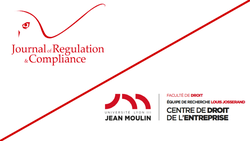
This scientific manifestation is placed under the scientific responsibility of Marie-Anne Frison-Roche and Jean-Christophe Roda. It is organized by the Journal of Regulation & Compliance (JoRC) and the Centre de Droit de l'Entreprise of Lyon 3 University.
It is the fourth colloquium of the cycle of colloquia organized in 2021 around the general topic of Juridictionnalization of Compliance.
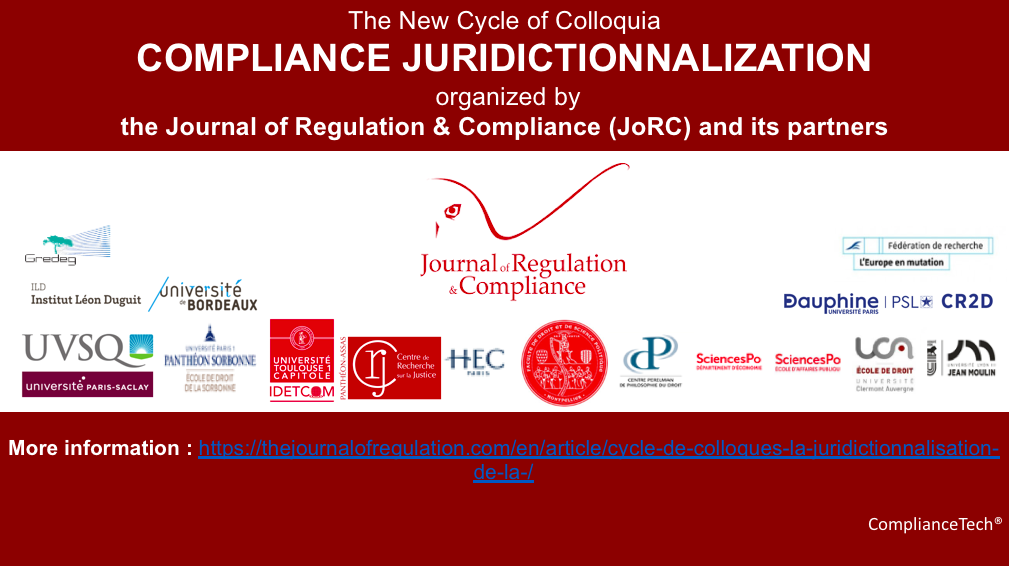
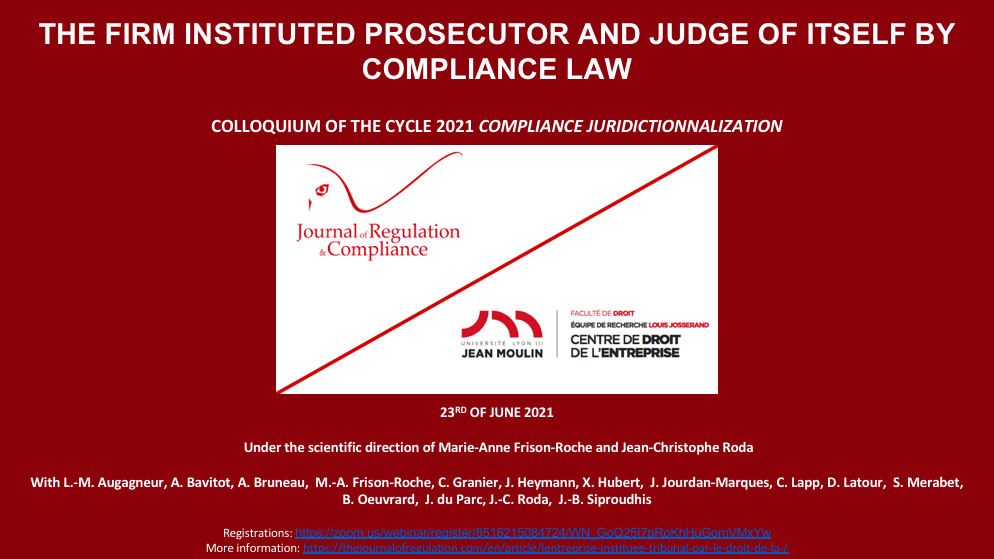
The different interventions will be then transformed into contributions in the books La juridictionnalisation de la Compliance and Compliance Juridictionnalization which will be published in the Regulation & Compliance serie, jointly published by the JoRC and Dalloz for the book in French and by JoRC and Bruylant for the book in English.
This colloquium will take place in Lyon 3 on 23rd of June 2021 with a limited audience. It will also be broadcasted in live on Zoom.
To register: https://zoom.us/webinar/register/8516215084724/WN_GoQ25I7pRoKhHuGomVMxYw
Presentation of the topic: Initially, it was through Criminal Law, inseparable from the trial, which forced companies to take charge of monitoring within themselves behavior likely to be deviant, the requirement of Ex Ante to be designed by the 'Ex Post of the jurisdictional. From this reversal of things, there has always remained this presence of the judge and the prosecution bodies in a Compliance Law which is nevertheless defined by its concern for the future and the Ex Ante tools within the company.
In doing so, the company becoming on the one hand a judge of itself, on the other hand a prosecutor of itself, it splits up, taking in reverse the most established procedural principles. Moreover, because of the monumental goals which constitute Compliance Law, companies become attorneys and judges of the others, or for the others, the cutting machines and the "supreme courts" being by name instituted to regulate in Ex Ante all different before that it does not become litigation. The Ex Ante of Compliance would then make the Ex Post disappear.
Method:
The colloquium which had to take place initially on 8th of April has been postponed to 23rd of June to enable speakers to meet and talk in face to face, with a limited audience.
These exchanges will be captured so that third parties can benefit from them, even before the publication of the works, La Juridictionnalisation de la Compliance and Compliance Juridictionalization, within which this work constitutes the basis for the development of a specific chapter.
Five practical cases will first be examined in five specific sectors, where this institution of the firm as prosecutor and judge of itself is particularly observable before both specific and more cross-sectoral themes are examined and discussed.
Will speak :
🎤Luc-Marie Augagneur, attorney before Lyon Court of Appeal, CVS Law Firm
🎤Alexis Bavitot, senior lecturer at Lyon 3 University
🎤Alain Bruneau, chief compliance officer at Natixis
🎤Jean-Marc Coulon, Head of Legal Infrastructure at Bouygues Construction
🎤Marie-Anne Frison-Roche, director of the Journal of Regulation & Compliance (JoRC)
🎤Cécile Granier, senior lecturer at Lyon 3 University
🎤Xavier Hubert, director of Compliance at Engie
🎤Jérémie Jourdan-Marques, professor at Lyon 2 University
🎤Jérémy Heymann, professor at Lyon 3 University
🎤Daphnée Latour, attorney before Paris Court of Appeal
🎤Christophe Lapp, founding partner of Altana law firm
🎤Samir Merabet, senior lecturer at Lyon 3 University
🎤Béatrice Oeuvrard, Public Policy Manager at Facebook France
🎤Jean du Parc, Bâtonnier
🎤Jean-Christophe Roda, professor at Lyon 3 University and director of the Centre de droit de l'entreprise (Center of Company Law)
🎤Jean-Baptiste Siproudhis, director Ethics, Integrity and CSR at Thalès

May 17, 2021
Organization of scientific events
This scientific manifestation is placed under the scientific direction of Marie-Anne Frison-Roche, Pascale Idoux, Antoine Oumedjkane and Adrien Tehrani. It is organized by the Journal of Regulation & Compliance (JoRC) and by the Faculté de Droit et de Science Politique de l'Université de Montpellier (Centre de Recherches et d'Etudes Administratives de Montpellier and Centre du Droit de l'Entreprise).
This manifestation is part of the cycle of colloquia organized in 2021 around the general topic of Compliance Monumental Goals.
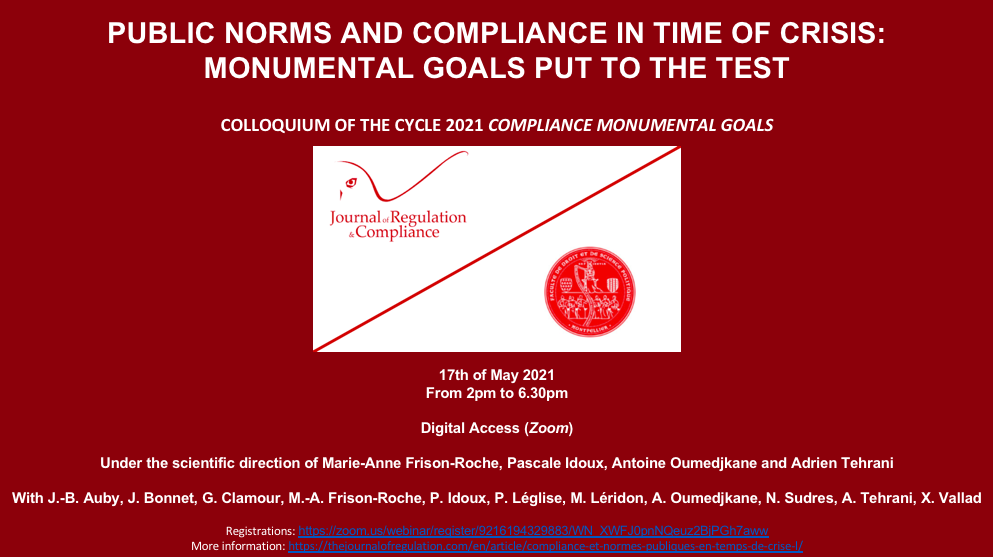

The interventions will give rise to the production of articles which will be part of the books Les bus monumentaux de la Compliance and Compliance Monumental Goals which will be published in the Series Regulations & Compliance, coedited by the JoRC and Dalloz for the French version and by the JoRC and Bruylant for the English version.
This manifestation will take place on Zoom on 17th of May 2021.
Registrations: anouk.leguillou@mafr.fr
Assistance to this event may be validated as part of the continuing education of lawyers.
In addition, scientific videos will be extracted and disseminated later.
Presentation of the topic: In the overall problematic of "Monumental goals", this conference retains a particular case: that of the crisis and the emergency situation that it generates.
First of all, in general, does the importance of public norms in the emergency context engendered by a crisis situation imply a marginalization of Compliance? Don't private actors also have their place in these circumstances, at the service of the "monumental goals" that the public authorities want to maintain, or even which appear specifically?
Secondly, more concretely, we have been living for many months in a health crisis. By taking it as a framework and, within it from particular cases, how public and private actors react, act, adjust? and how do the courts assess these movements?
Going from the most general to the most specific, this conference aims to identify criteria, limits, of what could be specific rules when the emergency of a crisis meets Compliance, and will examine specific situations.
Working method: The conference is therefore built on a general issue, which was the subject of a "working paper", written by Antoine Oumedjkane, Adrien Tehrani and Pascale Idoux, on which the speakers will have thought in advance and from which they are intended to study the question from their particular perspective.
The conference, which is essentially interactive, therefore begins with an outline of the main lines of this general work. It is followed by the examination of concrete practical cases.
They are as follows:
1️⃣ hydroalcoholic gel, its manufacture, price, availability,
2️⃣ information and regulation on all media in Covid period
3️⃣ the use of the bicycle during the state of health emergency
A first conclusion, thematically limited, will relate to Revealed by the crisis situation, the place of private initiative in Compliance Law.
A second, more general, undoubtedly open-ended conclusion is drawn from this confrontation between general reflection and concrete cases which must be resolved in a particular crisis.
Will speak:
- Jean-Bernard Auby, Emeritus Professor of Sciences po (Paris)
- Julien Bonnet, Professor at Montpellier University and member of the CERCOP
- Guylain Clamour, Dean of Montpellier Law School
- Marie-Anne Frison-Roche, agrégée des Facultés de droit, Professor of Regulation and Compliance Law at Sciences Po (Paris) and Director of the Journal of Regulation & Compliance (JoRC)
- Pascale Idoux, Professor at Montpellier University
- Pascale Léglise, adjointe au directeur des libertés publiques et des affaires juridiques (Deputy Director of Civil Liberties and Legal Affairs) of the Ministère de l'intérieur (Home Ministry)
- Michèle Léridon, Member of the Conseil supérieur de l'audiovisuel (French Media Regulator), President of the working group Pluralisme, déontologie, supervision des plateformes en ligne (Pluralism, Deontology, Supervision of Online Platforms)
- Antoine Oumedjkane, Researcher of the Centre de recherche et d'études administratives (Research and Administrative Studies Center) of Montpellier University
- Nelly Sudres, Maître de conférences at Montpellier University and member of the Centre de Recherches et d'Etudes Administratives (Research and Administrative Studies Center) of Montpellier University
- Adrien Tehrani, Professor at Montpellier University and member of the Centre du Droit de l'Entreprise (Company Law Center)
- Xavier Vallad, Group Legal Director, Intermarché
⤵️Read a more detailed presentation of the manifestation below:

March 31, 2021
Organization of scientific events
This scientific event is placed under the scientific responsibility of Marie-Anne Frison-Roche and Jean-Baptiste Racine. It is organized by the Journal of Regulation & Compliance (JoRC) and by the Centre de recherche sur la Justice et le Règlement des Conflits (CRJ) of the Panthéon-Assas (Paris II) University, with the active support of the International Chamber of Commerce ICC.
This event is the third colloquium of the 2021 colloquia cycle around the general theme of Compliance Juridictionnalization.
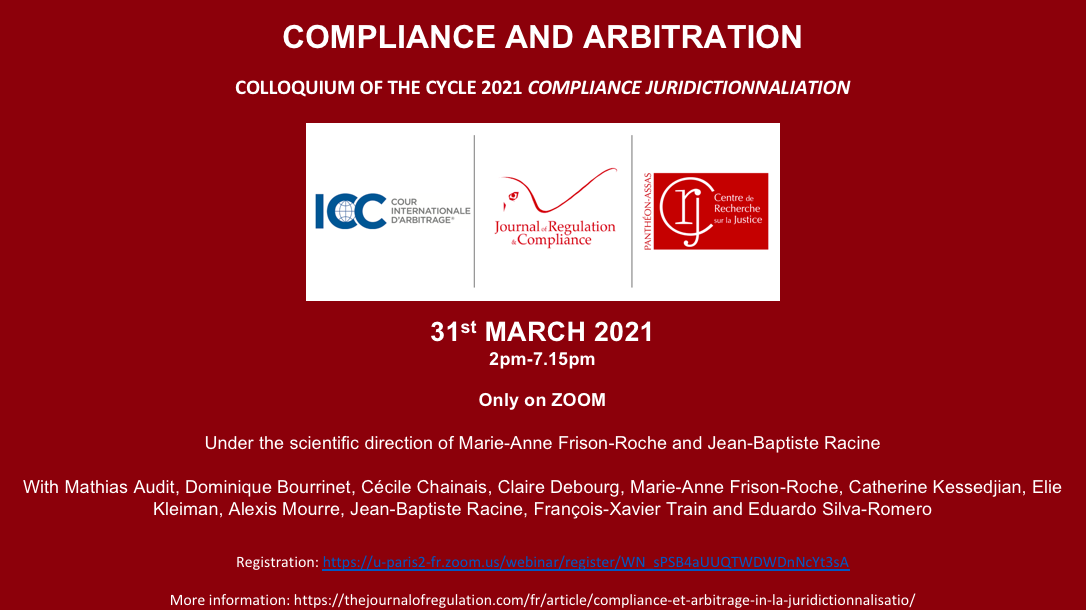

The different interventions will be then transformed into contributions in the books La juridictionnalisation de la Compliance and Compliance Juridictionnalization which will be published in the Regulation & Compliance serie, jointly published by the JoRC and Dalloz for the book in French and by JoRC and Bruylant for the book in English.
This colloquium will take place the 31st of March 2021.
The manifestation will be live broadcasted on Zoom.
To register: https://u-paris2-fr.zoom.us/webinar/register/WN_sPSB4aUUQTWDWDnNcYt3sA
Presentation of the theme:
The arbitrator is the ordinary judge of international trade. It was natural that he or she encountered Compliance: by definition Compliance Law takes hold of the whole world and follows the paths of international trade while it can only be deployed with the help of institutions which, by nature are spreading around the world and need authorities like the Courts.
The conference is based on the already perceptible connection points between Compliance and Arbitration to better identify what is emerging for tomorrow: contradiction or convergence between the two; weakening or consolidation. We are already seeing the impact that Compliance can have on the arbitrator's treatment of corruption or the consideration of money laundering. More generally, where do we stand with the arbitrator's knowledge of the many technical issues related to compliance? Beyond these, will the courts and arbitrators be able to achieve the goals, themselves new, sometimes monumental, pursued by Compliance Law?
Through this joint exploration of these avenues, the fate of compliance clauses inserted in contracts, the relevance in the matter of private codes of conduct, etc. will be examined.
Tomorrow, as of today, is the arbitrator a full and complete judge of Compliance Law?
How, with what specificities and what controls?
Notably will speak:
- Mathias Audit, professeur à l'Université Panthéon-Sorbonne - Paris I (full professor at Sorbonne - University - Paris)
- Dominique Bourrinet, General Counsel of Société générale group
- Cécile Chainais, director of the Centre de Recherche sur la Justice et le Règlement des Conflits (CRJ) and professeur à l'Université Panthéon-Assas (Paris II) (Full professor at Panthéon-Assas (Paris II) University)
- Claire Debourg, professeure à l'Université Paris X- Nanterre (Full professor at Paris X - Nanterre)
- Marie-Anne Frison-Roche, professeur à Sciences Po - Paris (Full Professor at Sciences Po - Paris)) and Director of the Journal of Regulation & Compliance (JoRC)
- Catherine Kessedjian, professeur émérite de l'Université Panthéon-Assas (professor emeritus of Panthéon-Assas - Paris II University)
- Elie Kleiman, partner, Jones Day Law Firm
- Alexis Mourre, president of the ICC International Court of Arbitration
- Jean-Baptiste Racine, professeur à l'Université Panthéon-Assas - Paris II (Full Professor at Panthéon-Assas - Paris II University)
- François-Xavier Train, professeur à l'Université Paris X-Nanterre (Full Professor at Paris X-Nanterre University)
- Eduardo Silva-Romero, Dechert Law Firm
Read a detailed presentation of the colloquium below:

June 18, 2020
Organization of scientific events
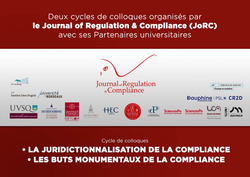
Like the precedent cycles dedicated to the general topic of Compliance, aiming to build a "Compliance Law" and aiming also to be published in the series Regulation & Compliance, coedited by the Journal of Regulation & Compliance and Dalloz, this cycle continues to deepen a specific aspect of this emerging branch of Law which has been applied before being designed.
The year 2020-2021 will give rise to two full and distinct cycles, the former deepening a key concept of Compliance Law, that are "monumental goals" and the later deepening a phenomenon with multiple roots and consequences: "the juridictionnalization of Compliance".
Compliance Monumental Goals has been proposed in 2016.
These various conferences will take place in different places, according to the role played by the very numerous universities which, this year once again, support the Journal of Regulation & Compliance for the realization of this cycle. This cycle will give rise to two books, one in French: Les Buts Monumentaux de la Compliance, and the other in English : Compliance Monumental Goals.
This cycle of colloquia Compliance Monumental Goals will start in October 2020 and will take place until December 2021.
- First colloquium: 17th of May 2021: Public norms and Compliance in time of crisis: monumental goals put to a test, co-organized by the JoRC and the Montpellier University Law School, under the scientific direction of Marie-Anne Frison-Roche, Pascale Idoux and Adrien Tehrani: more information about this manifestation here
- Second colloquium : 16th of September 2021, Compliance Monumental Goals: Radioscopy of a Notion, co-organised by the JoRC and Saclay University, under the scientific direction of Christophe André, Marie Malaurie and Benoît Petit : more information about this manifestation here
- Third colloquium: 4th of November 2021: Effectivity of Compliance and international competitiveness, co-organized by the JoRC and the Centre de recherches en Economie et Droit de l'Université Paris II, under the scientific direction of Laurent Benzoni, Bruno Deffains and Marie-Anne Frison-Roche: more information about this manifestation here

June 18, 2020
Organization of scientific events

Like the precedent cycles dedicated to the general topic of Compliance, aiming to build a "Compliance Law" and aiming also to be published in the series Regulation & Compliance, coedited by the Journal of Regulation & Compliance and Dalloz, this cycle continues to deepen a specific aspect of this emerging branch of Law which has been applied before being designed.
The year 2020-2021 will give rise to two full and distinct cycles, the former deepening a key concept of Compliance Law, that are "monumental goals" and the later deepening a phenomenon with multiple roots and consequences: "the juridictionnalization of Compliance".
The juridictionnalization of Compliance is perhaps as ancient as Compliance mechanisms themselves.
These various conferences will take place in different places, according to the role played by the very numerous universities which, this year once again, support the Journal of Regulation & Compliance for the realization of this cycle. This cycle will give rise to two books, one in French: La Juridictionnalisation de la Compliance, and the other in English : Juridictionnalization of Compliance.
This cycle of colloquia The juridictionnalization of Compliance will start in October 2020 and will take place until December 2021.
- Inaugural colloquium: Compliance juridictionnalization: why? Who? How? Where? and Toward What? , organized by the JoRC under the scientific direction of Marie-Anne Frison-Roche : read more information here
- Second Colloquium: 31st of March 2021 : Arbitration and Compliance, co-organized by the JoRC and Paris II University, under the scientific direction of Marie-Anne Frison-Roche and Jean-Baptiste Racine : read more information here
- Third colloquium : 23rd of June 2021 : The firm instituted as Court by Compliance Law, co-organized by the JoRC and the équipe de recherche Louis Josserand of Lyon 3 University, under the scientific direction of Marie-Anne Frison-Roche and Jean-Christophe Roda : read more information here
- Fourth colloquium: September 2021 : Which judges for Compliance? , co-organized by the JoRC and the CR2D of Paris-Dauphine University, under the scientific direction of Marie-Anne Frison-Roche and Sophie Schiller : read more information here
- Fifth colloquium: October 2021 : Compliance Law, crucible between American Procedure Law and Procedure Law, co-organized by the JoRC and the Brussels University, under the scientific direction of Marie-Anne Frison-Roche and Arnaud van Waeyenberge: read more information here
- Sixth colloquium: Proportionnality, Compliance balance, co-organized by the JoRC and IDETCOM of Toulouse University, under the scientific direction of Marie-Anne Frison-Roche and Lucien Rapp: read more information here